Pendragon by DivineCoffeeBinge
| 1 | Introduction |
| 2 | What Your Character Knows |
| 3 | The High Order of Knighthood |
| 4 | Our First Character Creation |
| 5 | Statistics |
| 6 | Lands and Peoples |
| 7 | Cambria |
| 8 | Peoples |
| 9 | Example Chargen |
| 10 | Glory |
| 11 | Ambitions |
| 12 | Ideals |
| 13 | Women |
| 14 | Game Mechanics |
| 15 | The Winter Phase |
| 16 | Ideals & Passions |
| 17 | Wealth & Swearing |
| 18 | Battle |
| 19 | Magician Creation |
| 20 | Scenarios |
Introduction
Original SA post
Pendragon is a game about Arthurian Britain - the Britain of Le Morte d'Arthur , that magical, never-quite-real land of King Arthur, the greatest ruler and best king of the world, of Lancelot du Lac, the world's greatest knight and his affair with Queen Guenevere that doomed it all, of Gawain and Tristram and Galahad, of the Questing Beast and the Holy Grail, of Merlin and Morgaine la Fey, and of Camelot, the shining city on the hill that has inspired mankind for centuries.
It is not "a game where you can act chivalrous," it's a game where chivalry is literally baked into the rules. There re a lot of things that Pendragon does poorly to my mind - its magic system, while thematic, is painful to use in actual play, and large-scale battles are abstracted to a vast degree, and the setting and in some cases the system is chauvinistic despite its best efforts to address the issue, and so on and so forth. There are a lot of things that Pendragon doesn't do well.
But there's one thing it does very, very well - and that is to model the adventures of a group of Knights in Arthurian Britain. Which is good, because that's the only thing it's expressly trying to model.
It is also the game that was used for literally the best campaign I have ever been a part of, which, fair warning, may color my impressions a bit.
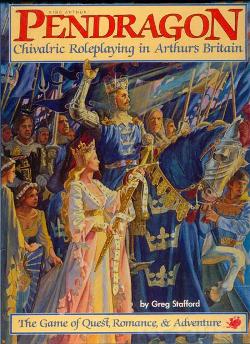
1st Edition cover
Pendragon has a long history; its first edition came out in 1985. That's right, Pendragon is 27 years old. That actually makes me feel really old so I'm not going to dwell on it. It is the brainchild of Greg Stafford, who is also the creator of Glorantha as well as a bunch of other good games; Glorantha is probably his greatest creation (and someone should post about it), but Pendragon is, in his words, his masterpiece.
The game eventually found its way into the hands of White Wolf, who published a 5th edition:
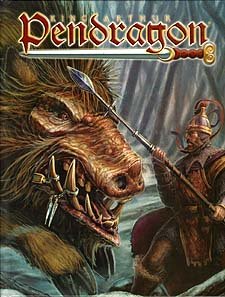
This edition is unfamiliar to me. I'll probably read it and post about it at some point, but it cut out vast swathes of character creation and it's not what I think of when I think of Pendragon.
No, what I think of is this:
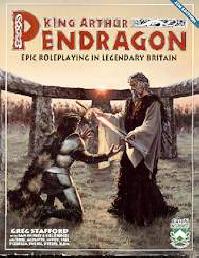
This is the 4th edition (oddly there was never a published 2nd edition), published first by Chaosium and then later by Green Knight Publishing. Published in 1993, this is probably the iconic edition of Pendragon for many people, being the only one available for a decade.
It's poorly laid-out and ordered and I don't care. It's what you're getting today.

So let's look at the introductory chapter, shall we?
quote:
PENDRAGON IS UNLIKE any game you have played. It has many revolutionary features which are novel to roleplaying games. It provides an imaginary method for you to participate in the wondrous world of King Arthur.
I don't know how revolutionary the features are, but there's a lot of neat things about Pendragon that don't show up in a lot of other games. We'll get to those when we hit the system. The book opens up with the 90s-standard "what is a roleplaying game" section, which we can freely skip; of interest, however, is a sidebar entitled "Which Arthur Is This?"
After all, King Arthur has been the focus of many, many, many depictions in fiction; which one do you use? The sidebar talks about several different broad categories of Arthurian depictions, from the traditional English and French tales and "histories" to more modern interpretations that depict Arthur as a modernizer, such as T.H. White's The Once and Future King , to the Welsh tales of The Mabinogion , to the more radical modern takes on the legends like Marion Zimmer Bradley's The Mists of Avalon , which cast the usually-villainous Morgan la Fey in a more heroic role as the last great defender of Paganism. Elements of all of these are found in Pendragon, but the basis for the game is really found in Mallory's Le Morte d'Arthur .
If you've never read Le Morte d'Arthur , go here . Read it. It's really very good. I suppose if you insist you could have the Cliffs Notes instead.
(Seriously, in my opinion there is very little reason not to have at least a passing familiarity with King Arthur if you're, like, a speaker of English. It's kind of, culturally, a Big Deal. But that may be pretentious of me, so feel free to disregard, I guess)
There's another sidebar - there are a fuckload of sidebars in this book - explaining that throughout the book there are still more sidebars using quotes from Mallory (usually) to illustrate game concepts and details, how they've been translated, and how the rules of grammar used to be very different back in the day so just run with it.
quote:
Mortality
All Pendragon characters will eventually die. This is a basic fact of the design. This must be so if the game is to reflect the important issues of legends and of life.
The world of Pendragon is more immediately violent than ours, and so combat is a regular part of the game - but combat in Pendrugon is a more serious matter than in most other adventure games. The chance of death or permanent injury is great. Worse, healing from damage is slow and uncertain, and magical healing is rare. Thus actions must be planned carefully, and violence cannot be used to solve all problems.
Aging is a part of the game, and includes the effects of old injuries, the ravages of disease, and other cruel realities ignored by most roleplaying games. Psychological effects also exist in the game, as they do in the literature. Madness or other emotional trauma can permanently affect a character, perhaps fatally in rare instances.
All of these factors impose an awareness on the players which provides motivation to play. After all, most everyone is a knight, and everyone is going to die, so the only variable to address is: what kind of knight are you going to be?
Another thing I'll delve into in more detail once we get to the relevant sections - in Pendragon, characters get old. As envisioned, every game session or so (in practice I find it usually equates more to each couple of sessions - "each adventure" is probably a better way to put it), the game's calendar moves forward one year; as such, your characters get old and frail. That doesn't mean you have to stop playing... it means you can play your character's kids instead. There are game mechanics designed to make this happen, which isn't something you see in a lot of games.
The chapter closes off with some explanations of other game concepts like Glory and chivalry and magic, and a brief timeline of how "stuff that happens in the myths" fits into the game's not-really-historical timescale (the Battle of St. Albans, when Uther Pendragon dies, is set at the year 495; the Battle of Camlann, when Arthur is killed, is pegged to 565.).
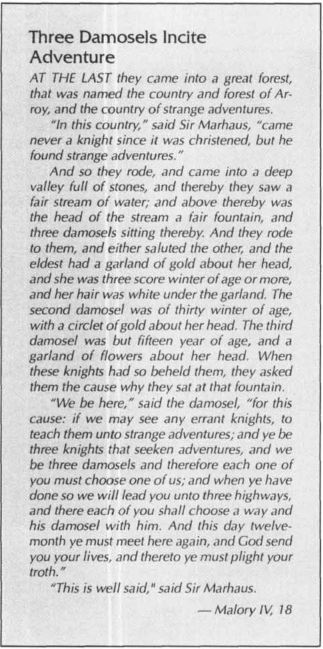
I'll just leave this here. Seems like as good a place to end as any.
What Your Character Knows
Original SA post

"...the basis for that agreement." I... sure, okay. I've never seen it phrased quite like that before, though there's no part of the above statement that I can disagree with.
The "What Your Character Knows" chapter is, of course, an exploration of the setting and the sort of things that your character, as a Knight of Arthurian Britain, would be expected to know.
Throughout the chapter are scattered sidebars, many of which explain details of the (approximate) time period that completely fucking mystify most people today - for instance, do you know the difference between receiving land via gift and receiving land via grant? Well, now you do - a gift gives you land only for the duration of your life, and when you die the land goes back to your lord. A grant can be passed on to your kids. That kind of thing. It's actually quite impressive how much detail is mashed into this book, really.
The book assumes that, as a rule, you will be beginning play at roughly the peak of Arthur's reign. Twenty-one years have passed since he pulled the sword from the stone. Arthur is a wise and generous King, and the sense of indolence and decadence that creeps into some of the later tales has not yet begun to affect him. There is discussion of the most famous knights and people extant at this time, such as King Arthur and Queen Guenever (Guenever being the usual spelling in Pendragon; if I slip and spell her name Guenevere like I'm more used to, blame me, not the book); the King's Champion, his nephew Sir Gawaine; the greatest warrior in the land, Sir Lamorak de Gales; a promising newcomer to the court of Camelot, Sir Lancelot du Lac; Merlin the Enchanter and Nimue, the current Lady of the Lake; Sir Yvaine, widely acknowledged to be the greatest of the Pagan knights; The Fisher King, Morgan le Fey, young Sir Mordred, Queen Margawse and King Mark, Sir Turquine of the Dolorous Tower, Sir Brus sans Pitie... yeah. There's a lot of names to get to know if you're not familiar with Arthuriana.
While later expansions (like The Boy King, which I'll doubtless get to in time) expand on ways to set a game earlier - or later - in Arthur's reign, this point, with Lancelot having literally just arrived a few years ago, is a nice place to start; the major wars have all passed, and the notion of Adventure is in full swing, so you don't have to fret much about fitting into a larger tableau. You can, as has been said, just have a maiden show up and say "Hey, knights. Any of you manly enough to handle this adventure I know about?" and watch the PCs trip over themselves trying to accept first.
Now let's talk about geography:
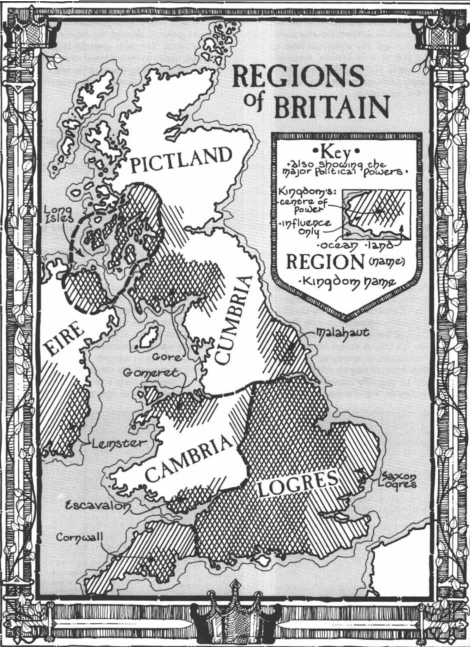
Logres is Arthur's Kingdom (and if, when reading about Amber Diceless Roleplaying or the books from which they're derived, you wondered where the Chaos-equivalent of the Pattern got its name, well, now you know - there's a lot of Arthuriana snuck into the Amber books). For those unfamiliar with the stories, it is sometimes surprising that King Arthur does not directly rule over all - or even most! - of Britain (and, it should be noted, even the use of the word 'Britain' is ahistorical; it should more correctly, given the time period, be called Albion or possibly Prydain if you're Welsh, but Arthuriana is generally referred to as "The Matter of Britain" so Britain it is). Logres is basically the height of civilization and awesomeness.
Cambria is western Britain - Wales (or Gales if you're French). It is a civilized land; half the nobles love Arthur, half hate him. It is described in further detail in the supplement Savage Mountains .
(Being the 4th edition, many of these supplements already existed when these rules were printed, so you don't have to worry about the whole "We'll tell you about this stuff in a book we haven't finished writing yet" thing that, say, Cthulhutech did)
Cumbria , meanwhile, is the land of the "northern British." Thematically it's basically Scotland - theoretically loyal-ish to Arthur but really not so much. Even the people that get along with him don't exactly meekly submit. Its supplement is Perilous Forest .
Pictland is pretty much everything north of Hadrian's Wall (and its supplement is, appropriately, Beyond the Wall ). Wild and uncivilized people who have blue tattoos live here, it's crazy. Of special note is the area of the Long Isles, which have been largely conquered/settled by Irish from Dal Riada. Arthur basically ignores the Pictlands; many of the island kingdoms like the Orkneys and the Out Isles swore loyalty to Arthur once upon a time but have now basically conveniently forgotten that bit, and Arthur doesn't care enough to make them remember because hell, why would he?
Cornwall is the Kingdom of King Mark, who in many ways is kind of a parallel Mirror Universe Arthur in the stories; whatever good qualities Arthur has, Mark has their opposite, and yet he still manages to maintain his independence. So far as I know Cornwall never got an "official" supplement, at least not for this edition; I have a .pdf copy of a document called Lands of Tristram that a friend got for me but I don't know how "official" it is.
(an aside - the character of Tristram in Arthurian legend is a curious one. Tristram is the greatest Cornish knight, and in many ways his story parallels Lancelot's - he, too, falls in love with his Queen while struggling to remain loyal to his King. Unlike Lancelot, however, he resists the desire for an adulterous affair, placing his loyalty above his heart, often to his personal cost. He is often described as being Lancelot's equal in all other things, and yet most people have never heard of him. Part of that is because frankly Mallory liked Lancelot more; part of it is that his motivations are a little unclear in the major English texts; part of it is that even Greg Stafford says he agrees with T. H. White's assessment that Tristram is "tough, and mouthed the platitudes of chivalry, but never really understood what it was about." It's a shame, because Tristram - also called Tristran or Tristan - is seriously awesome and the tale Tristan and Iseult is a classic. Poor guy never even gets stats in Pendragon.)
Brittany is also mentioned here; it is largely within Cornish orbit.
Ireland is the only other place to get a direct mention outside of the catchall "Europe;" it also has a supplement, Pagan Shore , which I found pretty enjoyable but then my first Pendragon character was Irish so I may be biased.
 It is chaotic and uncivilized and has more Kings than you can shake a stick at and Arthur pretty much leaves them alone these days since they stopped coming over in ships and trying to kill him.
It is chaotic and uncivilized and has more Kings than you can shake a stick at and Arthur pretty much leaves them alone these days since they stopped coming over in ships and trying to kill him.
The rest of Europe gets only a thumbnail sketch; Rome still exists though its Empire has crumbled, and actually the current Roman Emperor is... well, Arthur. He conquered the place a few years back. Gaul (France) is full of Franks, and the Franks don't like Arthur, which is why the lands of Brittany and Ganis, once friendly to Arthur, are now very much on thin ice. "Everything else can be treated as a feudal kingdom," says the book, "except the Byzantine Empire which is so far away it is out of play." The further north a place is, the less likely it is to be civilized, which is why Pictland and Scandanavia are full of crazy savages (Scandanavia later gets its own supplement, Land of Giants , in which Arthurian Knights can travel to assist Beowulf. I always thought that was pretty fuckin' metal).
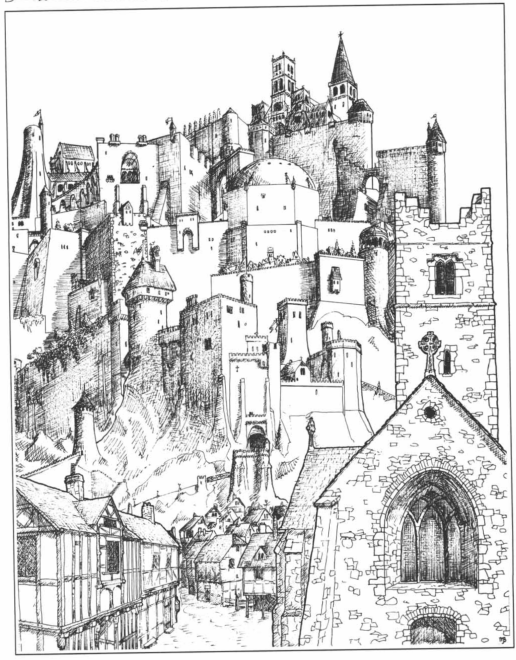
'Tis a silly place.
Then we spend some time talking about Camelot . You know how medieval cities suck? Camelot doesn't. That's pretty much what you need to know.
Sidebars in this section spend time talking about The Universal Laws: Hospitality (if someone is your guest be nice to them even if they just raped your mother and killed your father and announced that they intend to light you on fire; when they're a guest at your table you must treat them with respect and honor), Kinship (if someone is your kin they can be trusted, period - if your greatest enemy marries your sister, he is now your kin and the two of you have to start getting along), Loyalty (if someone is your Lord you fucking well act like it) and Honor. These laws are universally held even among the wildest and least-civilized Picts. Yes, these laws are occasionally hard to follow and will bring you into conflict with your stated goals and desires; that's the point, and there's a long list of examples in the canon. If your brother takes up arms against, say, Lancelot, then you better be ready to do the same too, even if Lancelot is your pal, because brother > pal. There's also a section on familial customs, inheritance, patriarchy, divorce (hah), et cetera.
We'll talk about Knighthood and Magic and maybe get into Character Creation later.
The High Order of Knighthood
Original SA postDKD posted:
That would be great. Do you plan on doing the supplements as well?
I never did answer this, did I? I'll probably do the Pendragon supplements if there's interest; I quite like them.
'Course, there's still plenty more core book to get through first, so....

Where was I.... oh! Right! The section entitled "The High Order of Knighthood" in the What Your Character Knows chapter. So, this is the stuff that every PC should instinctively grok about knighthood and being a knight.
quote:
In the beginning all men were equal, but the original sins of Adam and Eve condemned all humanity to live in the world. Envy and covetousness came into being, and might triumphed over right. Knighthood was instituted to restrain the unjust and to defend the weak. One man in every thousand ( ex mille electus ), the most strong, courageous, and loyal, was chosen to be a knight ( miles .) He was given a horse, the most noble of beasts, weapons, and armor. He was given a squire to serve him, and placed over the common people who were to till the earth and support the knight.
Since then it has been the duty of each knight to train his son to follow in his noble steps, and so the institution has continued. Biblical heroes were knights: Judas Maccabeus and King David, for instance. Ancient pagans were knights as well: Alexander and Julius Caesar are among their number.
Methinks that would be a surprise to King David, huh? Still, keep in mind that this isn't how the author thinks - it's how the PCs should think. Yes, you're making a living by killing people and leeching off of the backbreaking labor of your serfs, but this isn't Political Consciousness The Game, it's Pendragon. Knights are knights because God says so, now go be a knight.
Depending on your willingness to buy into the genre and its conventions, this can be problematic.
At any rate, the process of training for Knighthood is a formalized one; boys between the ages of ten and fifteen serve as pages, learning the ways of courtly life by doing assigned tasks and observing their elders (girls can be pages too, but they grow up to become ladies-in-waiting). At fifteen a boy can become a squire, following a knight around and assisting them. If they make the cut - many don't - then at age 21 they may be knighted (it's worth noting that some squires remain squires by choice; in some versions of the canon Lancelot had one squire throughout his entire career, who - if memory serves - refused to be knighted so that he could continue to serve Lancelot.
There are several grades of knighthood, as well; they tend to differ largely in the means by which they maintain themselves, at least at the lower ranks (knights have to spend money to keep their horse and armor in good repair). The lowest is the Knight Mercenary , who have no liege lord and so need to seek employment to maintain their equipment and status, usually as, well, mercenaries. What makes them different from a man-at-arms with a horse? Well, they took the oath of knighthood. That's about it.
Next is the Knight Bachelor , which is a knight who has sworn an oath of fealty to a lord but whose income and maintenance is paid for by that lord, either by cash payment or by the lord just taking care of their expenses. They usually serve as their lord's retinue and bodyguards, and they are typically unable to financially support a wife (this 'bachelor' acquiring its modern meaning). Bachelor Knights are entitled to bear a pennocelle , or small pennant, on their lance.
Next up is the Knight Vassal , who differs from a Knight Bachelor in that the Knight Vassal has been given land to rule and maintain. Since they have land, they have income, and so don't need anyone's help to pay for their shit. They may bear a pennant on their lance.
Finally, Knight Lords are knights who have other knights who've sworn fealty to them; anyone from a banneret to a King qualifies as a Knight Lord.
So those're the types of knights. So what are some important things about knighthood that knights oughta know about? Well, the first is that King Arthur is "The Fount of Chivalry." By reminding everyone about knighthood's ancient origins (see the quote above) and what it's supposed to be about, he has revitalized an ancient order and set of customs.
To commemorate this, and set forth a challenge for the kind of knights he wishes people to be, he has instituted a brotherhood known as the Companions of King Arthur. Every year at Pentecost, any knight who wants to be a Companion rides up to wherever Arthur is holding his feast that year and participates in a mass swearing of allegiance to Arthur; this allegiance is "stronger than the knight's oath to their lords."
(If your first thought is "that sounds an awful lot like a despotic ruler centralizing the military power of his realm under his direct control so that none may challenge him and his cult of personality," Pendragon may not be the game for you. Even though you're completely correct. We're supposed to ignore that kind of thing on account of how Arthur is a Good Guy, but seriously, sometimes he reminds me of a supervillain.)
Heraldry is also important to knights, and they each bear a personal coat of arms. a son's coat of arms is a variation of his father's; the son may abandon that difference when his father dies and he assumes his rights and station. Only a knight, his wife, and a hired herald (who must wear a special garment called a tabard) are permitted to wear the knight's arms.
A custom only recently introduced to Britain at this stage in Arthur's reign is "the Shield of Peace," which is a second shield that a knight may carry. Rather than the coat of arms emblazoned on his usual shield, this shield bears a different personal device by which the knight wishes to be recognized. The custom is becoming popular at tournaments, where the shield is typically a square shield (or targe) and is used in tourney events where rebated (blunt) weapons are used. Lancelot carries his everywhere because he's a trend-setter.
Badges are yet another identifying device, but this one is used to identify households or groups rather than individuals; the green sash of the Round Table is a badge, for instance, or the broom plant (or planta genet ) worn by soldiers of Anjou which gave their name to a dynasty of English kings. A badge in Pendragon is typically associated either with a knightly fellowship or with a household (so that a badge can be designed which, unlike the coat of arms, can be worn by a knight's servants and soldiers to show their affiliation).
There's a bit on Oaths and how they're important and breaking them makes you the lowest scum on all the earth.
When knights fight, they must first agree (excepting in times of war, obviously) whether they fight for Love or for Conquest. Fighting for Love means you're fighting because fighting is awesome; the winner will gain Glory but nothing else (round table knights are expected, whenever they battle one another, to do so for Love). Fighting for Conquest is more serious and openly hostile; if it doesn't end in death, the loser will typically be held for ransom - or, alternatively, the winner may claim the loser's mount, weapons, and armor and let the loser go (this is especially serious because a knight is literally defined by having a mount, weapons, and armor; the winner is symbolically stripping away the loser's knighthood).
Then there are adventures and quests, which are kind of a big deal in Pendragon but if you need me to tell you what an adventure or a quest is you're probably in the wrong forum, dude.
Magic... hoo boy.
quote:
Pendragon has a magic system which is used to imitate traditional magical effects seen in Arthurian literature, rather than to make comic-book flash-bang nonsense spells.
Pendragon's magic system is a little bit problematic, mechanically, but we'll get to that. What you need to know for now is that it's not AD&D magic, like, at all. Magic comes from the land; power is drawn from ley lines, that kind of thing. It's far more often used for illusions or divinations and miraculous prayers than anything else. Magic is accepted by the common man - everyone knows magic exists - but it's not trusted, and neither are those who practice it.
Finally, a section on...
quote:
The Enchantment of Britain
The magic of Arthur’s reign comes from the Enchantment of Britain. The causes of this enchantment are not clear: they began when Balin, the Knight of Two Swords, struck down good King Pellam; or as divine retribution to punish King Arthur for the sins which he committed; or simply because Arthur is the King of Adventure.
The era in which this book’s Pendragon campaign is set is the time when the Enchantments begin to flow out of the magical lands into the world of Logres. Encounters with human beings continue to be the most common event, but magic seems to be more common than in the past..
"The Enchantment of Britain" is basically the GM's excuse to have giants and dragons and shit show up once in a great while. There's strong basis for it in the canon, so that's good, but from a strictly roleplaying perspective, that's its job - to give GMs another storytelling tool.
This is getting lengthy for a post that covers something like seven pages, so I'll end here for now, but first a teaser...
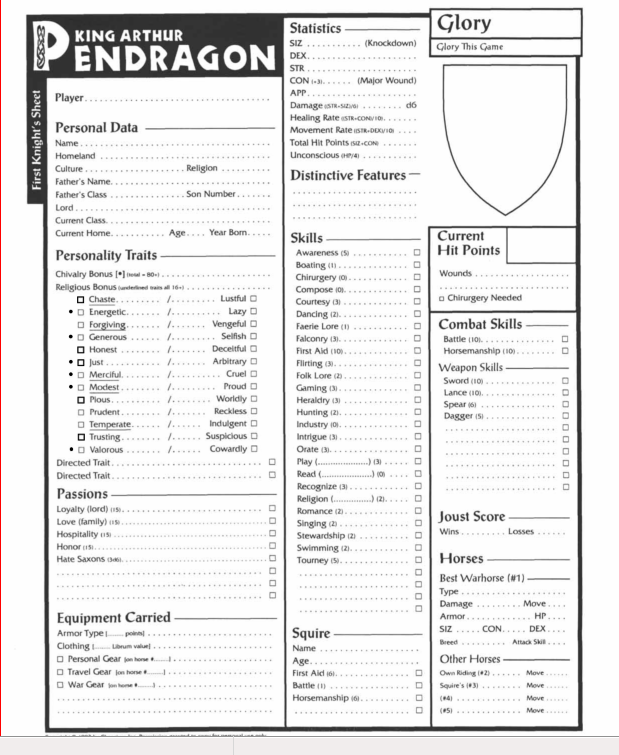
Your First Pendragon Character Sheet. Next time we'll be going through Beginner Character Creation, in which you create a Christian Knight from Salisbury. Don't look at me like that, you're a Christian Knight from Salisbury. You want to be Pagan or from Scotland or something? Suck it! We'll get to Advanced Character Creation later.
P.S. sorry for the wall of text but there just wasn't any art in there except for one random picture of a griffon that I didn't like much anyways.
Our First Character Creation
Original SA post
Now it's time for Our First Character Creation. Yay! Let's take a closer look at that sheet:

Here's how it works.
Step One: Determine Personal Data. Name, homeland, et cetera. In this example you're assumed to be a Christian Knight from Salisbury; you are further assumed to be the eldest son of a Vassal Knight from Salisbury, and the Earl of Salisbury is your liege.
Personality Traits and Passions. Now we're getting into the interesting bits. Look back at that list of personality traits. Each trait is paired with an opposing trait, and together those traits should add up to 20. The traits (which don't get fully explained until p. 193, but we'll survive) that. are:
* Chaste / Lustful
Being Chaste is about monogamy and faithfulness to the sexual mores of one's culture, not necessarily being virginal; A Chaste character who's married can still have kids. Being Lustful is about saying "Eh, fuck that, I wanna get laid."
* Energetic / Lazy
Probably pretty self-explanatory, this, eh?
* Forgiving / Vengeful
If someone lights you on fire, are you willing to tell them it's okay?
* Generous / Selfish
Probably the signature Trait of King Arthur, Generous covers the largesse of Saxon and Cymric chieftains and the Christian virtue of charity. A measure of how likely your character is to say "fuck you, I got mine."
* Honest / Deceitful
This is not hard to understand.
* Just / Arbitrary
Ah! One that requires at least a little bit of explanation, yay! A Just character is fair, impartial, knows right and wrong and cares about making decisions based on those values. An Arbitrary character doesn't give a damn about right and wrong; he uses other values to make decisions (like "good for me/not good for me" or "good for my lord/bad for my lord" or "I'm in a bad mood/I'm in a shitty mood").
* Merciful / Cruel
While easily explained, this category is probably the one that most RPG players, in my experience, find skewing in directions they didn't expect. Most of the things that are commonplace in, say, AD&D would be considered Cruel in Pendragon.
* Modest / Proud
Do you want to brag, or not? This is another one that has deeper impacts on play than most people think; modest people tend to downplay their own accomplishments and so can get less Glory, and yet for the 'default' cultural and religious values being modest is preferable.
* Pious / Worldly
A pious person doesn't just give lip service to their religion; they believe it. Pious/Worldly has no impact on actually doing religious things, but it's a guide to how well your character lives their faith.
* Prudent / Reckless
"Hey guys, maybe we should have a plan before we attack the giant." "Eh, screw that."
* Temperate / Indulgent
A Temperate character takes only what they need from life - food, drink, et cetera. An Indulgent person takes more. Sometimes lots more.
* Trusting / Suspicious
Yep. Self-explanatory. Well, except this - jealousy falls under Suspicion.
* Valorous / Cowardly
Yep. Another pretty self-explanatory one.
So, as you can see, the Traits are descriptors of a character's personality - and like other traits and skills, they can rise and fall during play. Now, some people will hate having a character's personality, even in a limited fashion, reduced to numbers; they're not necessarily wrong (even the book admits that at one point), but given how much of being a knight in Pendragon is a matter of personality and honor and other things that are hard to codify, using the Traits is a much better solution than the usual behavior-derived BS in many games (see: AD&D, paladins, falling).
Two particular categories of Traits are worth looking at. See those little dots next to some of the Traits? Those Traits are Chivalric Traits . If the sum of those Trait scores is equal to 80 or more, the character is considered a shining example of Chivalry, and they receive a bonus, called the Armor of Chivalry . This is an additional three points of Armor, over and above the armor granted by your armor and shield; you have three points of armor while butt-naked. As you'll see when we get to the combat rules, this is not a game-breaking benefit... but it's pretty damned useful.
The underlined Traits are Religious Traits . Each Religion has five Religious Traits; a character with 16 or more in all five Religious Traits gains a Religious Bonus . Like the Traits, this bonus differs for each Religion (for Christians, the bonus is +6 Hit Points). As your First Character is already known to be a Christian, the Religious Traits come pre-underlined.
A note on Religious and Chivalry bonuses - of all the possible in-game religions (with the possible exception - I don't recall right now - of Judaism, which is typically an NPC-only religion), only Christianity has no religious traits that are incompatible with Chivalry; Paganism, for example, has Lustful as a religious trait, which means that while it's possible for a Pagan character to get both bonuses but significantly trickier.
In beginner chargen, Valorous starts at 15, Christian Traits start at 13, and all other Traits start at 10; the player can then choose one Trait to raise to 16 (this can be a right-side Trait like Reckless or Lustful if they so desire).
You don't get any Directed Traits during beginner chargen; Directed Traits are modifiers to your existing personality traits. For instance, the people of Cambenet in Cumbria get the Directed Trait of *Trust (Logres Knights), so if a Cambenet Knight has Trusting of 12 and a *Trust (Logres Knights) of 6, then when dealing with a Knight of Logres they have an effective Trusting of 18.
Traits need not be rolled during play; they're meant to be guidelines. However, in certain stressful situations - or when a player is genuinely undecided as to how they might want to act - they can be rolled to push a character into a course of action. The exception - if a character has a Trait of 16 or more, they are renowned for that quality; they must roll the Trait when it's appropriate. If you're famed for being Lustful, you're probably not going to have a lot of luck turning down the pretty ladies.
Now let's talk about Passions . Passions are, unsurprisingly, the stuff that characters give a shit about, their strong emotions. Beginning characters in beginner chargen all begin with five Passions:
Loyalty (Lord) is - you guessed it - how loyal the character is to their liege. characters can generate multiple Loyalties; Loyalty (Arthur) if they swear to the High King or become Companions, Loyalty (Group) if they join or form a particular fellowship or band of brotherhood, et cetera. Characters with multiple Loyalties may have to roll them against one another when they conflict. Beginner PCs have this at 15.
Love (family) is pretty clear, too. Do you love your family? There y'go! Like Loyalty, a PC can generate other Love passions, like Love (deity) for a religious character or Love (wife) for a married guy. This, too, starts at 15.
Hospitality is how closely a character hews to the rules of hospitality as explained earlier in the book; I must confess that I've never actually had to roll Hospitality, but there it is. I'm sure it can be done. This starts at 15.
Honor is, you know, Honor... but Honor in the particular Pendragon sense of the word. A man cannot be a Knight unless he has the Honor Passion. Starts at 15.
Lastly, Hate (Saxons) is... well, look. Saxons killed a lot of British people. They're not beloved. Like Love, other Hate passions can be generated during play, and this is a great way to make the players realize who the bad guys are. Roll 3d6 to determine the starting value.
One other Passion that PCs tend not to start with is Amor, or courtly love. This is the Passion used to reflect being madly in love with a woman you haven't yet married. It is relatively common for a character to generate an Amor passion for a beautiful woman upon first meeting her (pretty common in the canon). Typically a player may have only one Amor active at any time, with one exception - it is not unknown for knights to declare a chaste and platonic Amor for Queen Guenever, providing a focus for their romantic impulses in the one unattainable woman who brought the precepts of Courtly Love to Britain. By doing so, a Knight can avoid spontaneously generating a new Amor by focusing on the Queen. Knights who refuse to generate any other Amor, focusing on the Queen exclusively, can join a brotherhood called the Queen's Knights, who are united in their devotion to Guenever.
So how are Passions used? Well, first we need to talk about skills. We haven't gotten to them yet, but run with this.
How you do stuff in Pendragon
It is important to note, I think, that this stuff doesn't get explained for quite a bit in the book. You go straight to advanced chargen, then into chapters on the lands and people, before you hit "actually using these stats you've written down." I think this is dumb, so I'll explain it here.
In order to use a skill (I know, we haven't hit skills yet, shut up), you roll 1d20. If the result is less than your skill, you succeeded; if it's above, you fail. If you roll a natural 20 on a skill that is less than 20, you fumble ; conversely, if you roll exactly your skill's rating, you have a critical success.
Now, you might be asking "if a skill is 20, how do you fumble?" The answer is, you can't. You're so good that you no longer have a chance to fail catastrophically (or, under most circumstances, to fail at all. Neat, huh?).
If you're making an opposed roll - say, trying to kill someone with a sword who is also trying to kill you - then the higher successful roll wins . If you have Sword 5 and you roll a 4, while your opponent with Sword 20 rolls a 3, you still win despite being a worse swordsman.
If your skill is greater than 20 , you lower your skill to 20 and use the extra points as a bonus to your roll (so, for example, if you have First Aid 23 and roll a 9, your effective roll is 12). You crit on a 20 or above (so if the guy with First Aid 23 rolls a 17, he crits - meaning he crits on 20% of his rolls).
...so that's using skills. Using Passions adjusts your Skills; you roll a Passion as you would a skill, which will Inspire you for the scene. You can only be Inspired by a single Passion at a time.
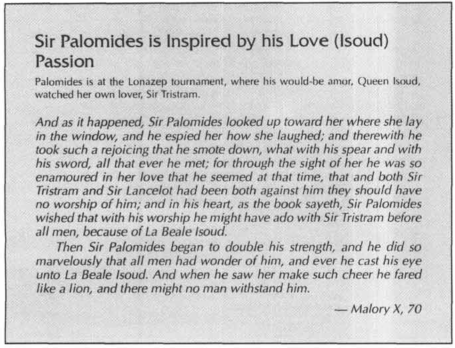
A successful Passion roll adds +10 to your skill; a critical Passion success doubles your skill and immediately increases the Passion by one point. A failed Passion means your character is Disheartened, and may act normally but with a -5 to all skill rolls for the duration of the scene, and will be Melancholic afterwards, meaning he'll basically be mopey and unresponsive and if you disturb him he will fly into a berserk rage. He will also immediately lose one point of Passion unless the GM decides otherwise. A fumbled Passion roll costs a character one point of Passion and also he immediately goes mad. Like, fishmalk crazy. He is so crushed with negative thoughts that he will - to choose an example from the canon - tear off his armor, run into the woods, and live as a hermit, eating nothing but berries and leaves and occasionally reciting terrible poetry.
quote:
Normally, mad characters run away immediately. For the duration of their madness, they will attempt to avoid the scene of their disastrous experience at all cost.
The madman is out of play until the gamemaster wishes to reintroduce him into the campaign, perhaps never. Storytelling considerations should be dominant in determining how long a madman is gone.
If recovered, the madman will have undergone unusual, unknown circumstances which can result in changes to some statistics and/or skills at the gamemaster’s option. Players should simply accept these changes, which should not always be negative. The character’s player will be unaware of what has been experienced, but may search for knowledge, and may eventually determine what events took place during the period of madness.
While this is pretty harsh, there's plenty of examples in the canon of knights going crazy (usually over women; hell, Tristram spends like half his story a raving lunatic). A good GM will use this as a storytelling opportunity; a bad GM will be a dick about it.
Note, by the way, that a character with a skill of 20+ who crits a Passion roll and doubles that skill will automatically crit every roll they make. Don't even bother picking up the die.
This is getting long, so we'll (maybe) finish Beginner Chargen next time. For now, have a picture of Sir Mordred which is probably my favorite single piece of art in the book.
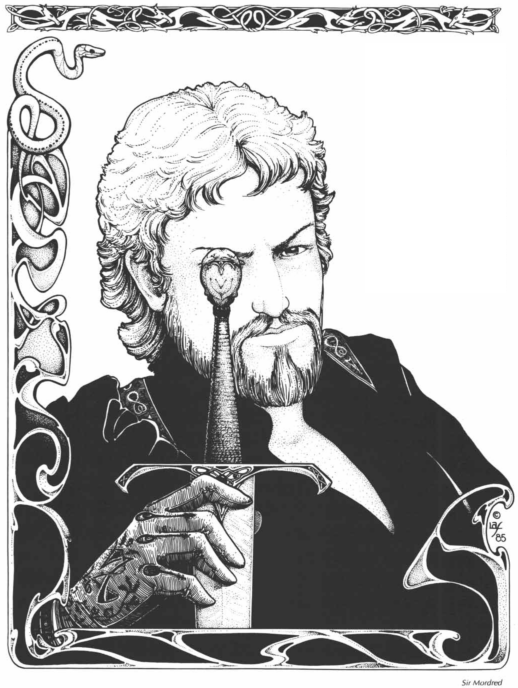
Statistics
Original SA post
So, we're back at Beginner Chargen. Let's see that sheet again:

We've hit Step Three: Statistics . You have five basic statistics, Size , Dexterity , Strength , Constitution , and Appearance . These can be rolled or you can use point-buy (beginner chargen only permits point-buy, actually, at 60 points to distribute). They range from a minimum of 5 (8 for SIZ) and a maximum of 18.
Depending on your Culture, you may see shifts to these stats; in beginner Chargen everyone gets +3 CON for being Cymric, but in Advanced there are other possibilities, like +3 DEX, -3 SIZ, -3 APP for Picts or -1 DEX, +2 APP for Romans or what have you. The attribute bonus can push an attribute past the limit of 18, so your effective limit on CON in beginner chargen is effectively 21.
These stats are pretty important in and of themselves, and can be rolled against in the same way skills are (but that should happen pretty rarely, really). Dropping below 3 in a statistic means your character is bedridden, and dropping to 0 means your character flat dies - yes, even 0 APP will kill you. Since you can lose statistic points every in-game year, during the Winter Phase (to be explained later), this means that minmaxing can be a really risky proposition.
Every year your character ages, they may gain one point in any stat of your choice - except that SIZ cannot be increased once you hit age 21, and no stat can be increased this way once you hit 35 (there are other ways to raise stats, but you lose your free point at 35).
Then there are the Derived Statistics . Your Damage is how hard you hit... with almost anything. While different weapons can do different things, many of them don't do additional damage, or only add damage in certain circumstances (like an enemy wearing chain armor or using a shield). Damage is equivalent to (SIZ+STR)/6 in d6 (so that a character with SIZ 15 and STR 11 does 4d6 in damage - use 'standard' rounding rules).
Healing Rate is the number of hit points you get back after a week of resting quietly; it is (CON+STR)/10.
Movement Rate is the number of yards per melee round that a character can walk while wearing armor; running, or not wearing armor, obviously increases a guy's speed. (STR+DEX)/10.
Total Hit Points should be pretty self-explanatory to anyone who's played roleplaying games. Or most video games. (CON+SIZ)
Unconscious is an HP threshold; drop below your Unconscious number and you're taking a nap, though you're not in danger of death (usually). HP/4.
Distinctive Features is a list of noticeable physical traits of your character; you get more of them for either having a high APP 9being handsome) or a low APP (being butt-ugly). They generally have no impact on gameplay but hey, why not, right?
You may note that APP has (rightly) very few applications to the killing things and/or riding around aspects of gameplay; it comes into play mostly when dealing with the reactions of others (high APP characters have an easier time in social situations because everyone in Britain is shallow) and romance (ditto). This is another strong artifact of the canon; being handsome is thought to roughly equate to being blessed by God, and God wouldn't bless someone unworthy, so handsome = good in more than a few eyes.
Step Four: Skills
See on the character how every skill has a number in parentheses after it? Those are the starting skill values for Cymric characters; your culture determines your basic skill levels.
You then improve these starting skill levels; choose any two non-combat skills other than First Aid and raise them to 10; choose any one skill at which you happen to be awesome and make it a 15 (Sword is a popular choice, the book notes); add a total of 10 points to whatever skills you want (though you cannot raise a skill that started at 0; Cymric characters cannot start with Chirurgery, for instance).
A quick rundown of the skills:
* Awareness is noticing shit, spotting ambushes, picking out small details.
* Boating is not falling overboard and drowning while on a water vessel.
* Chirurgery is Medieval Surgery. You don't have it and may never get it; it's not considered an appropriate skill for knights to study. Make sure you're friends with someone that has it, though (ladies are a good choice for this), because it's very helpful in Not Dying.
* Compose is writing songs, poetry, ballads, and war chants.
* Courtesy is knowing which fork to use and also knowing that it's considered bad form to call the King's mother a raging douchenozzle.
* Dancing should be self-explanatory.
* Faerie Lore is knowing about the fey folk; Fey Knights and otherworldly elves and such may well show up from time to time and this skill covers knowing what they're all about.
* Falconry is the art of hunting with birds, a very popular pasttime among nobles of both genders and most cultures.
* First Aid is knowing that maybe letting all that blood fall out of your sword wound is bad. It's purely triage work.
* Flirting is... look, I understand that some of the goonier among us might not get this one, but find a dictionary. I'm not ready to have The Talk with you. It is not necessarily the beginning of a seduction, though obviously it can be; still, it is not unknown for the nobility to flirt for the sheer enjoyment of it.
* Folk Lore is all those stories your nanny told you about monsters and dragons and boiling these plants in order to make love potions and whatever. Most of it's useless. Some of it's life-saving. Being a skill beloved of peasants, it is considered non-knightly.
* Gaming covers most recreational games of chance and skill. Checkers, dice, backgammon, whatever.
* Heraldry is an important skill. Everyone has all these coats of arms and personal sigils and household badges and stuff; Heraldry covers knowing which sign belongs to who. Very useful for seeing a knight's shield and saying "Hey, that's Sir Lancelot, maybe we shouldn't throw these tomatoes at him."
* Hunting is for tracking game, of course, but also for caring for your hunting hounds, knowing whether a beast is good eatin', butchering the kill, knowing what the different blasts on a hunting horn man, and general woodlands knowledge.
* Industry is another non-knightly skill; it's for building things and doing "honest work" like weaving or dying or tanning or farming. Basically, if peasants or women do it it's Industry. Knights who use an Industry skill are typically mocked to the point of being stripped of their rank!
* Intrigue is knowing who's fucking who at court and who's allied with who and listening to rumors and planting your own rumors and lying at any time.
* Orate is speaking clearly, fluently, and dramatically. Speechifyin'.
* Play (instrument) is, y'know, playing an instrument. Of the popular period instruments, only the harp and the lute are considered appropriate for knights to use; others are for commoners only, for various silly reasons (it was thought that flute-playing pinched the features and made the player look silly, for instance), though cultural exceptions may exist (bagpipes are okay for Irish nobles). While trumpets and drums exist, they are not for the making of music but rather for battles.
* Read (symbols) is a very rare skill for a knight or indeed anyone to have. Reading is for priests and magicians, after all.
* Recognize is being able to put a face to a name; it's like Heraldry, but for faces, not shields. It can be used to know things about a name you've heard, as well.
* Religion (faith) covers both following one's religion and knowing things about it; it does not indicate how much a person believes (that's the Piety trait) or what they feel in their heart (that would be a Passion) but how much they know.
* Romance is the tradition of fine amor or Courtly Love. A Lady of class and station requires more than flowers and an inviting wink; that's what this skill is for.
* Singing is self-explanatory.
* Stewardship isn't typically knightly, though there is no penalty for excelling at it; it is managing a farm or holding effectively. Most landowning Knights turn Stewardship duties over to their wife or (if they have one) their baliff; managing a household, after all, takes time that could otherwise be used for war or jousting or Strange Adventure.
* Swimming is the art of getting into water and not breathing it and sinking like a stone.
* Tourney is not participation in the battle portions of a tournament, like a joust or a melee - it's running one and knowing how to behave at the portions of the tourney that don't involve breaking heads. Knowing how to set up one's pavilion before entering the lists, for instance, or knowing how to publicize one's tourney to ensure attendance.
Of the combat skills, it should be noted that every weapon or weapon type has its own skill; all swords are covered by the Sword skill, with the exception of those giant two-handers covered by Great Sword. It is also noted here that brawling/unarmed combat, and the use of missile weapons are considered unknightly behavior. Grappling, however, is A-OK for some reason (and is its own weapon skill, though a rarely used one in my experience).
Other than the weapon skills and Horsemanship, which are pretty self-explanatory, Battle requires a bit of attention; it's any instance of combat that involves more than just yourself and your enemy/ies. It is used for commanding a battle, or for commanding a unit within a larger battle.
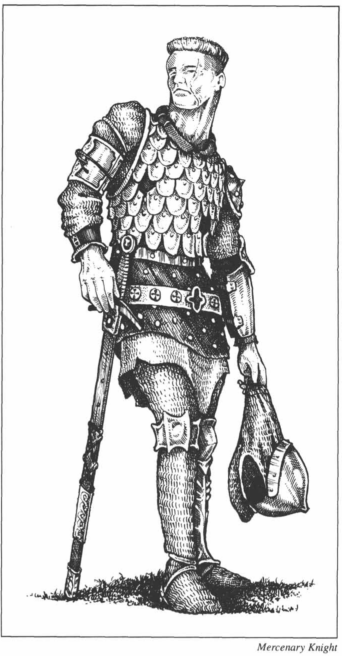
This is getting wall-of-text-y so here, have a Mercenary Knight
While I'm in the section of the book that gives the skill descriptions, I may as well give the weapon descriptions too, huh?
*Axes do an additional die of damage against opponents using a shield.
*Bows do 3d6 damage, period.
*Crossbows do variable damage depending on how large they are, and take time to reload. A light crossbow does 1d6+10 and can be fired once a round; Mediums do 1d6+13 and fire every two rounds; heavies do 1d6+16 and fire every four rounds. Knights should never, ever use them. The Pope has outlawed its use against Christians (though the commoners seem not to have heard).
*Daggers do one die of damage less than usual.
*Flails do an additional die against anyone wearing chainmail and ignores any protection from a shield, but on a natural roll of 1 they hit the user instead of the enemy, for full damage.
*The Greataxe is a two-handed weapon and does an additional 1d6 against everything, plus an extra 1d6 vs. shields.
*The Greatspear is a two-handed spear that gains a +5 skill modifier against mounted targets, thus negating the penalty an unmounted person faces while attacking a mounted combatant. This is the skill used for boar spears, also.
*The Greatsword does 1d6 extra damage to everyone. On a tied attack roll the greatsword breaks their opponent's weapon (unless it's a sword: see swords).
*The Halberd does 1d6 extra damage and, when used by a footman, provides a +5 skill bonus when used against horsemen (negaing the usual penalty for an unmounted person attacking a mounted foe).
*The Hammer does an extra d6 damage to anyone wearing plate-style armor (partial plate, full plate, and Gothic Plate, some of which are not available until the later years of Arthur's reign).
*Javelins do two fewer dice of damage (minimum 1d6) but can be thrown.
*The Lance is special in that it does not use a character's Damage rating when the character is doing a mounted charge; instead there is a special Damage rating for horses that determines a lance's damage. A Charger-mounted knight does 6d6 with a lance, for instance - 8d6 on a Destrier. For smaller knights, lances make a great equalizer. Using a lance against an enemy using anything that isn't a lance or a greatspear gives the lancer a +5 skill modifier when charging ; when not charging, the lance uses the spear skill. If the damage done by a spear is an odd number the spear breaks.
*Maces do an extra 1d6 vs. chainmail.
*Morning Stars are two-handed and do an extra 1d6 damage to everyone (like all two-handed weapons) and an extra 1d6 vs. chainmail.
*Spears cannot be thrown like javelins, but they can be used from horseback like a lance (and when used in a lance charge, they break on an odd numbered damage roll like any lance).
*Warflails are just like regular flails only two-handed, and thus get an extra 1d6 damage on top of all the other flail stuff.
*Finally, swords seem pretty boring compared to all of the above, huh? Well, swords are awesome, and here's why - swords don't break . Every other weapon on the list (save the greatsword) breaks when the user fumbles, but swords don't break, they just drop - and on a tied resolution roll a sword breaks any non-sword weapon.
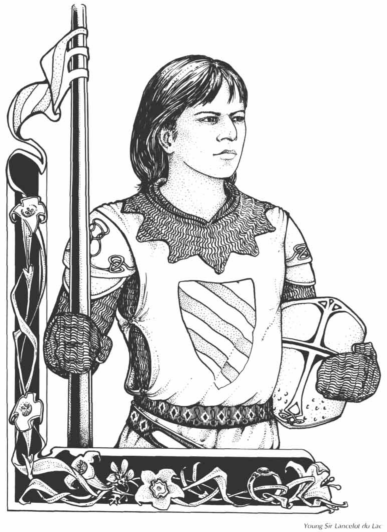
Young Lancelot, seen here preparing to beat the piss out of the last person who said he looked like a girl
Okay, holy crap, we're at Step Five: Previous Experience .
See, all that stuff we did above created a 21 year old character. You may want to (or need to, depending) make your starting character a bit older - in advanced chargen this is often a requirement because your 21 year old might not qualify for knighthood yet, though basic chargen characters always do by age 21. So for every time you increase his age by 1, you get to do one of the following things:
*Distribute 1d6 points among your skills. No skill may be raised this way if it has a rating of 0, and no skill can be raised above 15.
*Add one point to a Trait (to a max of 19) or Passion (to a max of 20).
*Add one point to any stat except SIZ (caps at 21, remember?) without exceeding the maximum level.
Step Six is to qualify for Knighthood; as mentioned, all beginner chargen characters qualify. Congratulations, you get 1000 Glory for being Knighted; I'll explain what that does and what it means in a future post. Design your coat of arms now.
Step Seven is all the miscellaneous stuff. Every son inherits 1/10th of his father's Glory, determined either when the character enters play or the father dies, whichever comes first (so if a character enters play while his father is still alive, and his father earns a boatload of glory two years later, the kid doesn't get a share of that). Children of Vassal Knights like basic chargen PCs inherit 6d6+150 Glory.
Joust Score starts at 0 wins and 0 losses; it is meaningless, but some people like to keep track of that kind of thing so there's a spot for it.
As a beginner character you get standard equipment: to wit, Reinforced chain mail (12 points) 2 spears, shield, sword, dagger, 5 jousting lances, Fine clothing worth 1 Libra, Charger, rouncy, sumpter (listed above). Enjoy! You also get Personal Gear (random stuff your character has, like a second set of fine clothing, et cetera - nothing important), Travel Gear (tent, stakes, et cetera), and War Gear (random crap you might need on campaign, like paint to fix up your shield or a few bottles of wine or extra pairs of warm socks).
Then you get to roll on the Luck Table, which determines some extra bennie you may own, anything from money (given in Librum (singular Libra) and denarii (singular denarius)), a family heirloom (like a fine old sword that gives +1 to your sword skill but breaks like a non-sword, or a valuable item of jewelry), a healing potion (exceptionally rare and priceless), or an extra horse.
Then you start looking at the back of the character sheet:
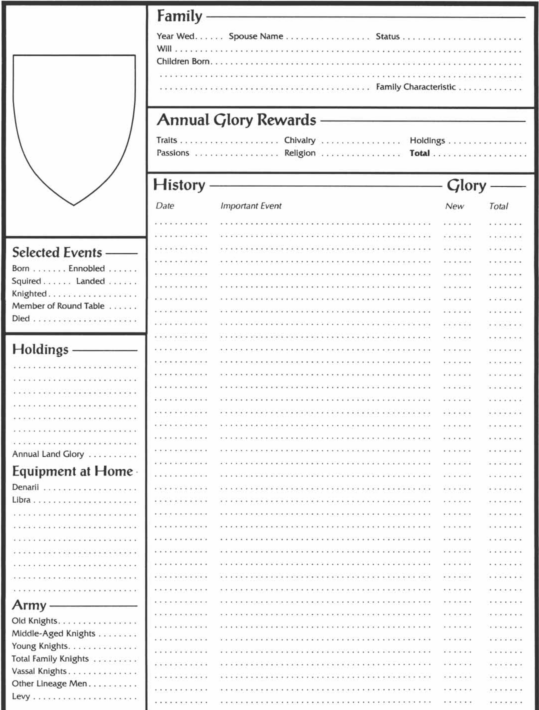
Most of it is recordkeeping for your family and your personal history, but there are a few things of note - one if the Family Characteristic . You roll on a table to determine it; it's usually a skill boost to one particular skill, ranging from +5 to +15, depending on the skill. Add that value to your skill, and yes, you can break the cap of 15 with it. This characteristic stays in the family - your character's kids will have it too (it specifically travels through the male line - sorry, Mom!).
The other item of note is the Annual Glory Awards. Every Trait of 16 or more gives you Glory equal to its rating every year during the Winter Phase; you add up that total and enter it there on the back. Ditto Passions. You gain Glory for owning a Holding, when and if you get one, and you also get 100 Glory per year for maintaining your Chivalry Bonus or your Religious Bonus (or both).
Next Time:
Lands and Peoples
Original SA postPurpleXVI posted:
Pendragon: I actually kind of want to play this now! Not sure if I'd want a full campaign or anything, but just a quick adventure where everyone is a STEREOTYPICAL KNIGHT who SAVES MAIDENS could be immensely fun. Also if nothing else, some of it could be used to add flavour to GENERIC KNIGHTS in some other setting or game.
Best compliment I could ask for!
 Seriously, Pendragon is a hellaciously fun game and it is a great resource for modeling knights and other chivalric warriors for other games; as much as I've had to gloss over a lot of flavor text, the flavor alone makes the game worth a look in my book.
Seriously, Pendragon is a hellaciously fun game and it is a great resource for modeling knights and other chivalric warriors for other games; as much as I've had to gloss over a lot of flavor text, the flavor alone makes the game worth a look in my book.

Before we get into the Lands and Peoples chapters, a quick note on Advanced chargen and how it differs from the beginner version:
Your character is, at the end of the basic chargen procedure, not a 21 year old knight - he's fifteen , and usually ready to be a Squire. You can start play as a squire or you can age him up until he hits the threshold for knighthood. Those extra six years of age allow for a goodly amount of customization.
The chapter includes one of my favorite quotes:
quote:
This new system can provide many different character types who are nonetheless coherent within Arthurian society. Some of these types, in fact, have never appeared in Arthurian literature, and so your exploration may be an original experience.
No effort has been made to make each type or nationality “balanced” for play. Instead we have tried to make each type consistent within the system, and also interesting and challenging to roleplay.
While many games have unbalanced character types, it's not often a game comes out and admits it. How you feel about the lack of balance depends on how you approach a game like this; is modeling the source material more important than making sure everyone at the table is roughly equivalent in ability and utility? It's a good question to think about, I find.
Your character's homeland is randomly determined, and you're sent to the appropriate section of the Lands chapter - 45% of characters will be from Logres when rolling randomly, but other possibilities are Cambria, Cumbria, The North, Cornwall, Brittany, the Western Isles, France, and Gaul (and later sourcebooks add even more possibilities). Culture and Religion are based on your homeland; if you're from Hampshire, you are either (depending on a second roll) a Cymric Christian or a Saxon Wotanic character.
You also get some modifiers to your character depending on your Father's Class; in basic chargen, your father was a vassal knight, but in advanced your father could be anything from a squire to a footsoldier/warrior to a chieftain to the local seneschal to a priest or druid.
Starting equipment is given as a list of Outfits; depending on your Luck Table rolls you may increase your character's outfit by a rank or two. Outfit One has you starting off with cuirbouilli armor (boiled leather) and a couple of weapons; outfit six starts you off with six horses and partial plate and a ton of weapons and four squires. You probably won't start with outfit six.
As mentioned, you age your character up until he qualifies for a knightly class; you don't have to stop there, though. Nothing prevents you from continuing to age your character until you qualify for a higher class; if you're not interested in playing a Mercenary Knight you can always age up a bit more until you qualify for Bachelor Knight, for instance - or until you qualify for a Chivalrous or Religious bonus. Enjoy rolling on the aging tables sooner than anyone else!
One thing that doesn't get openly discussed in this section but which bears some thinking about is that many characters generated through this system may have different Liege Lords; if one Knight is from Salisbury and sworn to the Earl of Salisbury and then another knight is from Lindsey and sworn to the Duke of Leicester, and those two lords go to war, what do the PCs do?
Usually this isn't an issue because characters are (or should be) given the opportunity to swear to Arthur; as mentioned earlier, oaths to Arthur are held to be more important than oaths to the Lords that actually pay for your armor and suchlike. Still, it's something people are going to want to keep in mind...
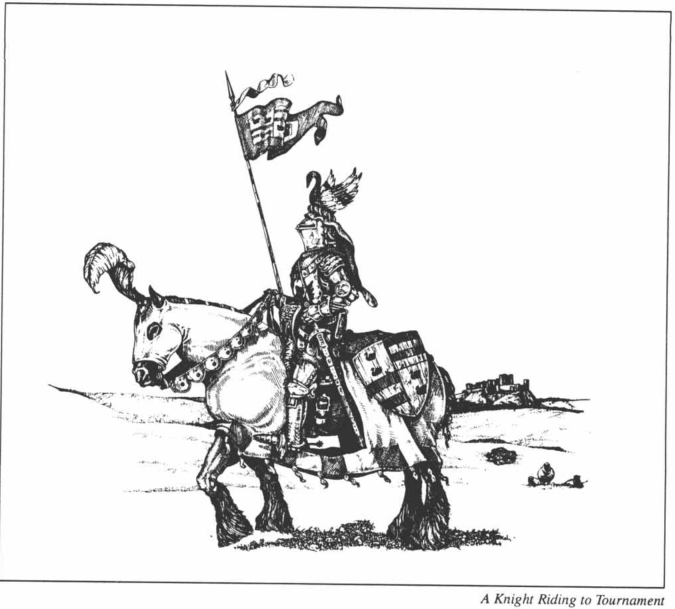
This section of the book is light on interesting art so you'll take what you get and like it. It's a cool picture, though
The next chapter is called Your Family . There is a series of sidebars running through this section that you can use to generate a family history for a character created in basic chargen; this can let you get a better idea of who your character emulates. It also lets you generate a Glory rank for them so that you can inherit the 'correct' amount of Glory rather than just grabbing 6d6+150.
The tables are pretty linear; every year there's a chance something awesome happens, but in order to ensure a 'proper' history, your grandfather will die in 508, having acquired the family Manor (and inspiring your father to gain a Hate (Saxons) Passion; his last words are something along the lines of "watch out for those guys that wear bear skins and roar"); your father will die by 530 so that you can inherit his Manor.
The meat of the chapter is about family and its use in a Pendragon game; using the past family to create interesting stories and plot hooks, using the future family (wives and sons) to create dramatic tension and story possibilities... and future player characters. As has been mentioned, Pendragon is a dynastic game; it is designed to let your characters grow old and die or retire and have their sons or nephews or cousins adopt their quests and avenge their deaths. This is supported throughout the canon; the deeds of King Pellinore echo down the years to affect his son Sir Lamorak, for good and for ill, just to name one example.
There's some neat stuff in this chapter; the dynastic style of Pendragon leads to some really fun story hooks.
We're finally at the Lands section, and since it's mostly a travelogue I'll see what I can do to jazz it up a bit, probably by skimming through and cherry-picking the interesting stuff.
It's noted that there are certain lands a character can never be from; Camelot, for instance, or London, which are great cities but inappropriate for various reasons, or regions that are designed as 'places to have adventures' instead of 'places to live,' like Somerset or Norgales, or places that are hostile to Arthur like the Out Isles or Sorestan.
We start off with a section that is basically Geography For Dummies (here's what we mean when we talk about Hills, et cetera) and another section on travel; the main roads of Britain are the King's Roads, and everything that happens on them is considered to have happened in Camelot so don't do bad things on them. Generally they're built from the remnants of the old Roman roads. They are safe, they are well-traveled, they're patrolled by Round Table Knights and local nobles. Then a couple of paragraphs about boats and we're ready to get into the meat-and-potatoes of the chapter by talking about the geographical regions and how to read the entries... and then we get my new favorite Pendragon quote, which I can't believe I forgot was in there:
quote:
Pronounce the names in this chapter as you prefer. Most Americans cannot properly decipher most English names anyway.
Hah!
So - let's discuss Logres . Logres is Arthur's personal Kingdom, and is the safest, sanest, most civilized region in Britain. Mallory refers to Arthur as the King of England; Pendragon reinterprets that to mean "King of Logres," as modern England is a lot bigger than Arthur's realm and period-appropriate England doesn't exist yet, because it's still Angle-land or Anglia, which is treated as a Duchy.
Some highlights:
*Duke Hervis of Anglia hates Saxons, and the local Cymric are actually a ruling minority; most of the populace is Saxon, but one cannot be a Saxon Knight from Anglia because Hervis won't allow Saxons to be knighted.
*Arden Forest has a nice description, typical of the "wilderness descriptions" In Pendragon in that it is more plot hook than information:
quote:
North of Wuerensis the Arden Forest separates Logres from Cambria. It is re-
nowned for its wonders: the Three Maidens can be found here to lead adventures, and their names are Spring, Summer, and Autumn; the Rainbow Cavalier also haunts these forests; and the Great Red Deer of Warwick makes its appearance every three years.
*There are three Avon Rivers on the map. Apparently naming conventions in Pendragon are wacky.
*Bedegraine is a fairly uninteresting region in this description; its earl has a middle-aged daughter who has an illegitimate son, whose father remains unknown; this son, Borre of the Strong Heart, has just been knighted. This region also includes Nottingham, home of Britain's oldest pub, and the city of Bedegraine, now called Derby, a small city.
*Hampshire used to be called the Kingdom of Wessex, and is now the personal demense (domain) of King Arthur. Camelot is, in this setting, equated with modern-day Winchester; Southampton and Chichester also get mentions.
*The regions of Clarence and Gloucester are pretty much constantly fighting. Here's Greg Stafford on the topic:
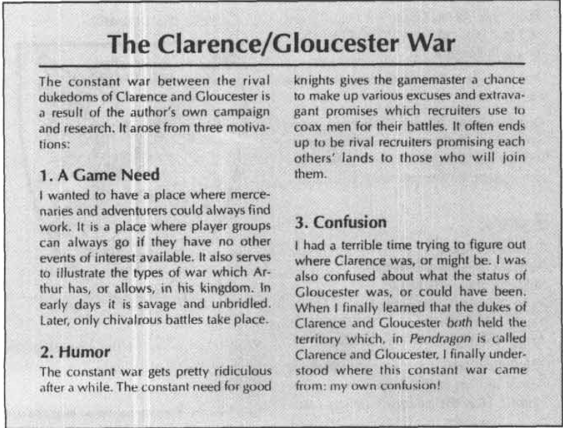
*Hertford is a pretty poor region but includes the city of St. Albans, Britain's most popular site of Christian pilgrimage. Since pilgrims and travelers provide a good chunk of the region's income, they have grown to distrust Pagans, because Christians bring them money and Pagans don't bring them jack squat. A compelling narrative on comparative religion, that.
*Kent was one of the old Saxon kingdoms, and "its people claim to be Jutes, but everyone knows they are really Saxons."
*Lindsey is the most populous region of Britain; its ruler is sometimes called the Duke of Leicester. The actual region of Leicester was the most important place in the area when the Romans ruled Britain, and its people still consider themselves Roman; they're kind of mad that the Duke has moved his court and focus to Lincoln.
*Lonazep is an important, if unremarkable, castle; you might know it better as Stamford.
*Salisbury is the heart of the setting; indeed, it gets a chapter all to itself later.
*Bath, in Somerset, is a prosperous city and has been since Roman times; its mineral springs are alleged to have magical properties.
*Glastonbury, also in Somerset, is a holy place hidden along the Avalon Marsh; if you enter through one side you find yourself in the oldest Christian abbey in Britain, but if you go back out and go around to the other side and enter over there you find yourself in a great Pagan sanctuary. You cannot go from one to the other without going back outside first.
*The lords of Southports are refugees from Ganis who fled to Britain when the French conquered their lands.
*The region of Wuerensis is a borderland kingdom of mixed pagans and Christians; they exhibit great tolerance, and are distrustful of anyone displaying strong religious tendencies one way or the other (i.e. people who get a religious bonus).
Cambria
Original SA post
The travelogue continues! Note that there's a lot more info in the book than I'm giving here; I skip over a few places, too. Mostly I just care about "will this be funny.interesting/informative?" and if not, I slide on by.
So let's talk about Cambria . Cambria's pretty much Wales Plus; much of it is either neutral towards Arthur or outright hostile, though the Cambrian lords that like Arthur like him a lot.
Much of Cambria is mountainous - the mountains aren't especially tall, but they are steep and rugged. The mountains can hide as many rich and fertile valleys as a GM wants, which can be a great place to insert heretofore-undiscovered peoples; arrogant chieftains, minor, insular nobles, small villages that have escaped feudal rule entirely, whatever.
* Cameliard is an important Cambrian Kingdom, what with it being the home of King Leodegrance, whose daughter, Queen Guenever, you may have heard of. She will inherit the kingdom in her own right, being Leodegrance's eldest daughter (he has no living sons).
* Cheshire is home to the City of Legions (Chester in modern-speak), which is both central to a large agriculturally-rich region and also the best place in Britain to trade with the Irish. The Dux of the City of Legions is sworn to the King of Norgales.
* Escavalon was one of the first Kingdoms to swear to Arthur when he was but an untried boy, and their King has no children, willing his lands to Arthur after his death. The people of Escavalon are pretty smug about that whole 'we backed the winning horse before you latecomers' bit.
* Carlion, often called Carlion-on-Usk, was Arthur's favored city before Camelot's construction; it is home to Archbishop Dubrucius, the head of the Church in Britain.
* Estregales is the last of the Irish Kingdoms that once littered the area; its King has been loyal to Arthur since the old days.
* Galvoie is a small but prosperous kingdom, with an army strength listed as "insignificant." Notable is "Roche Sanguin (“Bloody Rock”) is an enchanted castle of women, ruled over by the dowager Queen Yguerne, Queen Morchades, and the princess Clarissant. It is small in size." Gee, can't think of any interesting adventures there...
* Gomeret was the land of King Pellinore, a famous Round Table Knight; after Pellinore's disappearance it was taken over by a new King, who is much less friendly to Arthur.
* Gwaelod is a small Kingdom that has never submitted to Arthur or anyone else for that matter, and while it has an army its main protection is that it's surrounded by wilderness and is just a pain in the ass to get to.
* Norgales "is populated by many small, warlike, fiercely independent clans whose loyalty is never permanent, except to the holder of the Crown of the Ordovices, a magical artifact. The crown has the displeasing habit of disappearing on its own, reappearing to be seized at a magical site called the Court of the Crown. Then the
peoples of Norgales have no lord, but patiently await the next bearer of the crown, who will have had to prove himself worthy of wearing it by virtue of arms and wit. King Galihodin currently has the crown, and hence also the title of King."
* Powys is ruled by a King, but most of its people spurn the "lowland" ways of Arthur and his court; there are very few Knights here.
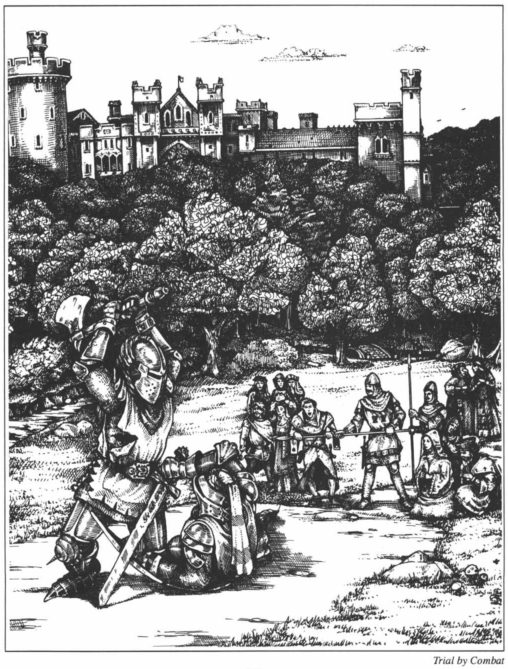
Cumbria is all of the lands north of Logres and Cambria but south of Hadrian's Wall. Most of it is uncivilized wilderness, though with the opening of a new King's Road, Arthur has begun to expand his influence here.
* Cambenet's Duke recently swore fealty to Arthur, though less out of love for the High King and more because they didn't want to be swallowed up by King Uriens of Gorre.
* Malahaut is a vastly prosperous Kingdom, ruled by The King of 100 Knights, also sometimes called The Centurion King. Once hostile to Arthur, they have accepted vassalage.
* "Everything west of the mountains and east of the sea is covered by dense, unsettled forests. Collectively, these woods are called the Perilous Forest, and they are full of marvels." But don't go there, it's much too perilous!
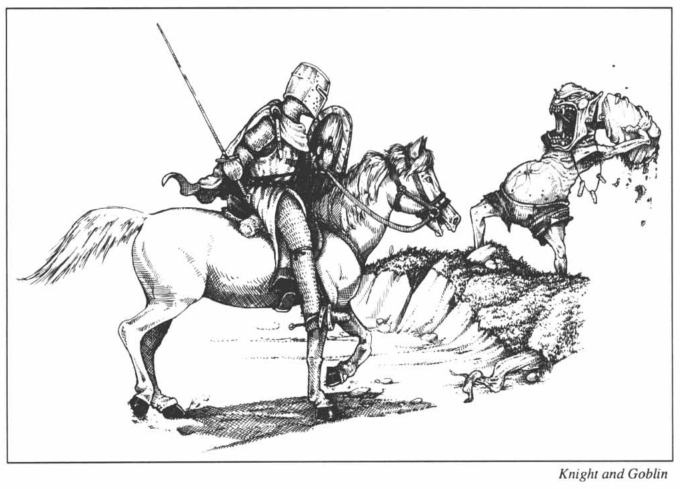
The North is where the Picts live.
* Benoic is the only Christian land among the Picts, and its people are suspicious of their Pagan brethren.
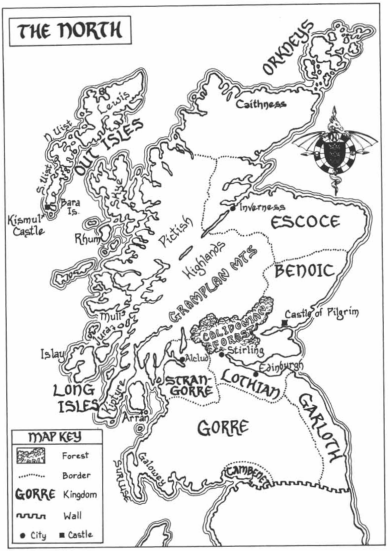
Finally, a map!
* Escoce's people have largely embraced chivalry, after their defeat many years ago by Arthur.
* King Uriens of Gorre may be married to Arthur's sister, Morgan le Fay, but banished her after her last attempt on Arthur's life; his loyalty to the Pendragon is unquestioned.
* Lothian was once ruled by King Lot, who was the center of resistance to the High King's rule; since his death at the hands of King Pellinore, his sons decided not to bother ruling Lothian because it was more fun to hang out in Camelot and be awesome knights (you may have heard the names Gawaine, Gaheris, Agravaine, Gareth 'Beaumains,' and Mordred; that's them). Though stewards of the Pendragon officially run the Kingdom now, Lot's wife, Queen Margawse, is stull much admired here.
* The Orkneys are Margawse's personal domain. Its army consists of "100 knights, many fierce footsoldiers, limitless wild Picts, and legions of night demons." It is not a nice place to visit.
* The region of Surluse is ruled by the Duke of the Long Isles, and is a bastion of traditional Irish culture, meaning they go on cattle raids that piss off their neighbors (especially Strangorre) pretty much constantly. They have adopted chivalry and knighthood.
Cornwall gets only a single page, but it's kind of a neat one. "Cornwall is made up of many small, fiercely independent tribes, each with its own sub-king. The King of Comwall is whoever gains and holds the ancient crown of Dumnonia. It is usually taken by conquest from each predecessor. The crown-holder must also convince his countrymen to follow him, either by love, bluff, bribe, or conquest. King Mark of Totnes has done that."
Cornwall and Brittany have close ties, and trade all the time.
* Devon's capital of Exeter was plundered by Saxons not all that long ago, but under King Mark it has undergone a renaissance, and is now a wealthy trading port.
* Lyonesse is the home of Sir Tristram, a promising young Knight in Mark's court.
* Tintagel is the place where Arthur was born. It is ruled by Sir Jordans; "Jordans was the leader of the former duke’s household knights, and has sworn to Mark as his liege, but only in the name of steward. Only Jordans knows who the actual lord of Tintagel should be. Nonetheless, the people continue to hold Morgan le Fay, daughter of their last duke, in admiration and awe."
* Totnes is King Mark's homeland, and is under near-constant attack from the region's native giants.
Brittany is a chunk of what is now France.
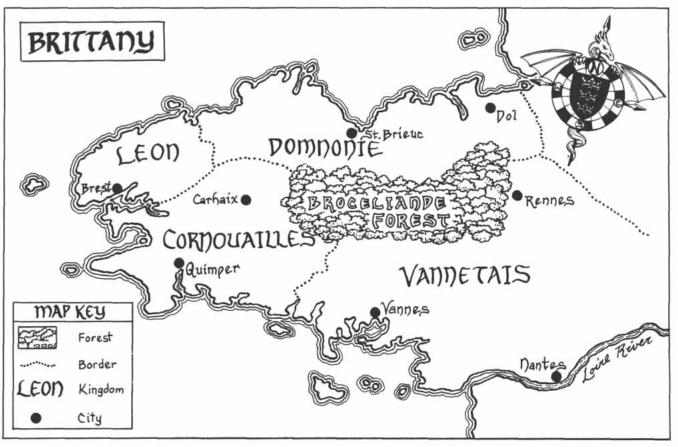
Everyone here is Cymric, except for some of the cityfolk, who are considered Roman. They tend to favor either King Mark, or nobody. The Kingdom of Vannetais is notable for its peoples' hatred of the French.
When discussing the Western Isles , the "important" isle is, of course, Ireland.
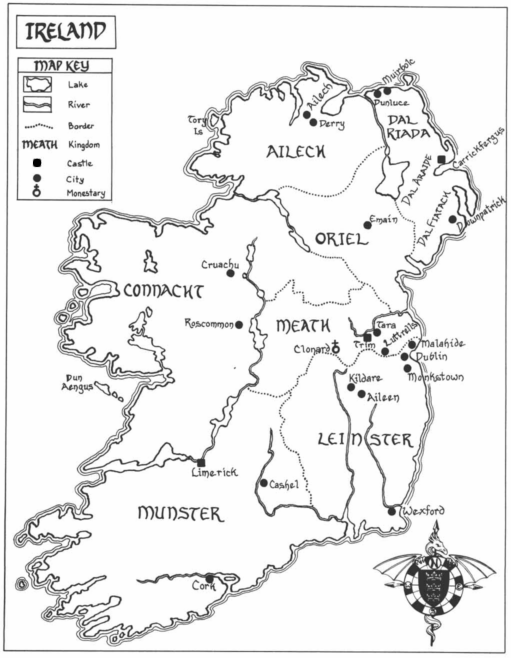
Christianity was brought to Ireland by St. Patrick, and the Kingdom of Leinster has been feudalized, as well. There are several ethnic groups on Ireland, from the native Cruithni - who are Picts with a different name, basically - to the Irish; the expansion Pagan Shore also introduces the Lochlannoch, a somewhat ahistorical Norse group. There's not a lot here that's groundbreaking; I'll leave it until we hit that expansion.
France is ruled - mostly - by the House of Merovee, or Merovingians. Most of their lands don't get along with the British much at all , and in fact only five of their lands - Anjou, Champagne, Flandre, Normandie, or Poitou - are available for PCs to be from.
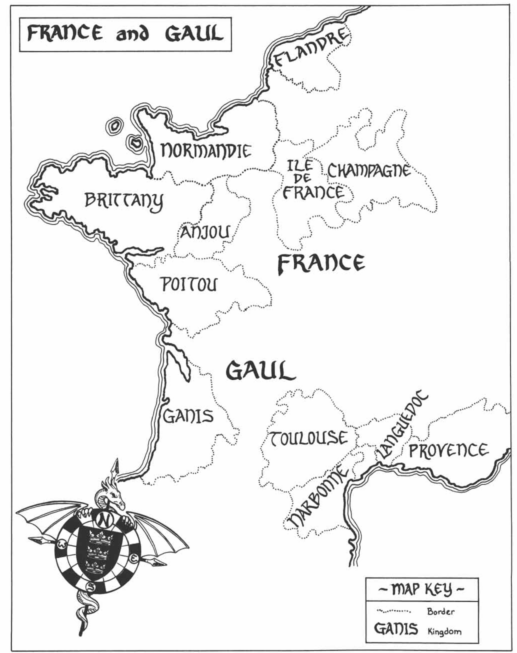
The Franks honor chivalry as much as anyone (no surprise, considering that's where the word comes from and all), but are bitter enemies of King Arthur.
Meanwhile Gaul is kind of a mess, and has been, historically, for a long while yet. There is actually a special entry on the homeland table for "Ganis Exiles" - many knights and lords of Ganis fled to Britain when King Claudas of the Franks treacherously slew King Bors de Ganis and King Ban. They get to roll on the Logres table for their geographical homeland but keep their Occitanian culture.
There is also a special entry on the "Father's Class" table for Gaul, the Free Holding Knight : "Many knights in Gaul have no overlord. Their holdings are called allodial holdings , and they exercise all rights over the property as if they were kings. This unusual status is a residue of the Roman Empire, when many people held private property."
Free Holding Knights can choose their own lord - and do, since everyone needs the protection - but each successive landholder may make their own choice.
* Ganis (or Aquitaine) is a region of incessant war, where sometimes even the Church is not respected.
* Narbonne is noted for their religious tolerance; it is the only land of origin where player knights can, with GM approval, be Jewish.
...and that's it for the Lands chapter! Next up is the Peoples chapter, wherein I try to glean an interesting post out of a chapter that is easily 75% charts.
Peoples
Original SA post
I'm bored, so you all get more...

As promised, we're in the
Peoples
chapter - the vast majority of which is tables and lists. Each culture has entries for:
Stereotypes
, the way people of this culture are typically thought to act by others;
Player Knights
, the unique challenges or opportunities faced by PCs of this culture;
Common Attitudes
and
Politics
, which again have specific stereotypes;
Names
, a list of sample, period-specific names for both male and female characters of this culture;
Traits and Passions
, a list of bonuses or penalties to those stats based on region, as well as a list of specific Directed Traits or passions divided by region;
Skills
, the starting values for each skill; and
Inheritance
, which details the starting Glory and equipment for a PC based on their father's class.
So for example, the
Cymric
culture...
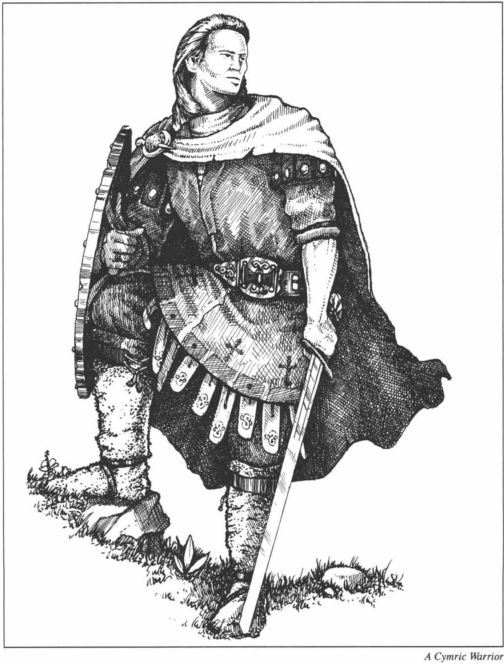
...has no stereotypes; they are said to be "too varied." You can't classify the differences of the group that makes up the norm, really. The Cymri are a tribal people, usually giving their direct loyalty to their local King, though in areas where they have been feudalized they have typically transferred their loyalty to their local lord.
It bears noting that this "screw the local Lord, I'm loyal to the King" attitude is probably the reason that Arthur's Companions and gift for getting knights to sweat fealty directly to him work so well, though the book doesn't mention that.
"Cymric names look ridiculous and are hard to pronounce in real Welsh. Don’t
WORRY about spelling or pronouncing a name “accurately,” but choose something that sounds right to you and spell it the way you want," the book tells us. Sample male names include Cynwal, Bleddig, Gwenabwy, Madog, Rhodri, and Ysgarran for males, Angarad, Arianwen, Ffraid, Heledd, Indeg, Llio, and Nest for females.
Cymric from Logres get bonuses to several passions due to the good influence of Arthur, while Cambrian Cymri get more 'conservative' bonuses to reflect their local culture. Cumbrians get bonuses for being stubborn and resistant to change, while Northerners get no particular explanation for their bonuses. Who knows? Cornish Cymri get trait bonuses to reflect "King Mark's bad influence" while Cymri from Brittany get shifts to represent their "pioneer spirit" (and I'll list them so you get an idea of the type of bonuses under discussion: Energetic +1, Modest +2, Prudent +2, Valorous +l).
Then the local directed traits and passions; some interesting and/or funny examples include Carhaix City, Brittany (*Suspicious (all Bretons)), Gorre, Cumbria (*Trust (witches)), Hertford, Logres (*Selfish (food)), Lonazep, Logres (Fear
1
(marsh monsters)), Tribruit, Logres (*Worldly (fine clothes)).
1
: Fear is another Passion that kind of breaks the usual Passion rules, in that you never get to roll it for anything beneficial. I forgot that one earlier, sorry.
You've seen the list of starting Cymric skill levels in basic chargen; the only thing really notable is that each culture has a Favored Weapon, and for the Cymri, it's Sword.
The
French
are a proud, occasionally brutal people, and their King, Claudas, is kind of a treacherous dick. They are not big fans of the "soft, effeminate" ways of the south. French player characters will probably have a lot of trouble fitting in and earning peoples' trust in Britain. Pendragon France is a lot like the France of the Hundred Years' War - a patchwork of lands whose boundaries are ever-shifting and where mercenaries are always welcome.
Example French names include Amis, Bretonnet, Fromondin, Gilles, Hervis, Jehan, Mercadier, and Vincent for men; Alais, Beatrix, Bellisent, Elisabeth, Galienne, Marie, Nicole, and Yde for women.
The French, unlike most peoples in Pendragon, are fairly homogeneous and all share the same trait modifiers and directed traits rather than getting a regional list; apparently every Frenchman has the Trait of *Indulgence (wines) +1d6. Lucky them.
The French cultural weapon is the lance.
To the south one finds the
Occitanians
.
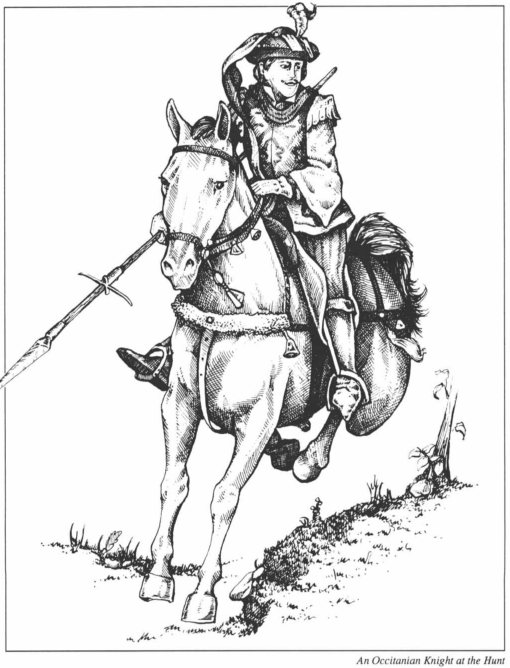
They are cultured and elegant and chivalric and kind of arrogant little twats, but while they find Britons and Franks barbarous, the Britons are less so and thus preferable.Their cultural love of chivalry helps them get along with most all of Arthur's knights.
Sample male names include Alexis, Berel, Cadmar, Emeric, Gobert, Lucas, Raoul, Remi, Thierry, and Victor; sample female names include Agnes, Babette, Diane, Edith, Heloise, Nicole, and Sibille.
Like the French, the Occitanians - even their exiles - share the same traits and directed trait (*Suspicious (all religious fanatics)), but they have no cultural passions. Their starting skills have a heavy emphasis on courtly activities, and their cultural weapon is the lance.
The
Irish
actually get a reduced roll to Loyalty (Lord); to them loyalty to the family is vastly more important (and unlike most cultures, younger sons do not get a lower Loyalty (family)). Feudalized Irish are often eager to prove that they can be as civilized as any of Arthur's knights; unfeudalized Irish could care less. "Most lrish kingdoms hate each other more than they dislike foreigners, so King Arthur has been able to make many friends."
The Irish actually get their own pronunciation guide for their names list. Sample male names include Aed, Brion, Comman, Diarmait, Fachtna, Lorccan, Nathi, and Tadc; sample female names include Berbail, Dunlaith, Finnguala, Grainne, Mor, and Sadb. There's also a section on Clan Names such as the O Niall or Mc Cleary.
Probably my favorite of the possible Irish Directed Traits is the one for Pomitain, *Valorous (at sea).
The Irish starter skills have an emphasis on things like Compose or Play, and their cultural weapon is the Spear.
Now for the
Picts
:
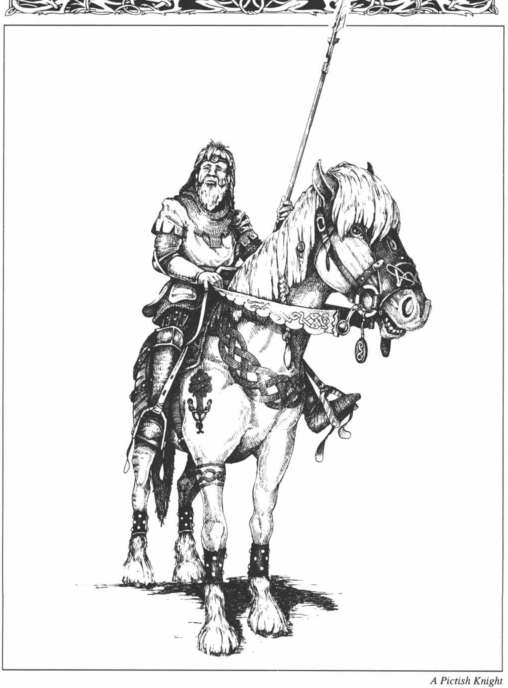
I quite like the way the art director handled the spear tip heading into the upper border there
The game tells you flat out that the Picts are treated ahistorically; they are the blue-painted tattooed savages of the wild lands.
quote:
Player knights may come only from the two regions which have adopted civilized customs from lands with which they interact. The wild Picts of the highlands contribute no player characters. No player knights come from the Out Isles, Orkneys, or Irish kingdoms either, because of the inherent difficulty of playing characters from enemy lands. No Navarese Basques are available, either.
After a small list of male names, the book notes that nowhere in history has a female Pictish name been recorded. Pictish skills are heavy on Lores and their cultural weapon is the Great Spear.
The Romans are, by this point, largely found only in cities; they are proud, cultured, practical, and often pretty devious. "Romans everywhere, whether from Rome, London, or Paris, have the same beliefs in imperialism, urbanism, and Christianity, even though they disagree about which empire should rule."
Sample names include Arcavius, Donicus, Dumnorix, Galerus, Magunnus, Novellius, Tanicus, and Vepgenus. Female names are created by taking any of the male names that don't end in "-rix" and changing the ending to "-ia," so that Arcavius becomes Arcavia. All C's are hard, pronounced like a K.
All Romans have a Loyalty (city) Passion, (city) being their homeland; they also get a Loyalty (Emperor) Passion, but that rarely matters in play as the current Roman Emperor, in canon, is Arthur.
(seriously, one day a bunch of Roman Senators came to Britain and said "Arthur, the Emperor wants some taxes" and Arthur said "screw you, the Roman Empire left Britain" and they said "Doesn't matter, officially you're still subjects" so he said "Oh really? We'll see about that" and then marched his troops to Rome and conquered it)
Romans are the only culture besides the Picts whose men begin with points in Chirurgery (and so can raise it during chargen); they also begin with points in Read (Latin) and are the only culture who begin play literate. Their cultural weapon is the dagger.
(preferably lodged in someone's back, according to the usual chatter in my gaming group)
Finally we come to the Saxons .
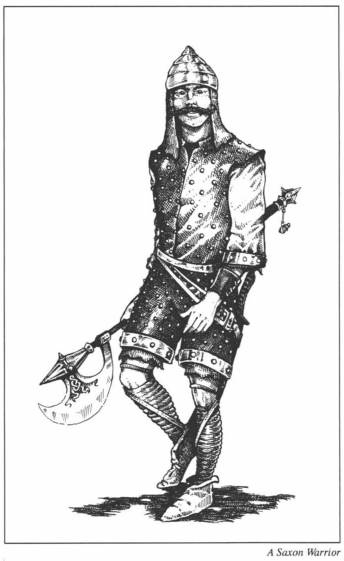
Look at that fucking mustache. Yeah, that's right, fear this handsome motherfucker
The Saxons are, stereotypically, all "RRARGH, FOR WOTAN" Viking berserker types; they have only recently been conquered by Arthur, and thus have only recently come into contact with ideas like knighthood and chivalry and Christianity. While there are some slight cultural differences between the three types of Saxons represented in Pendragon - the Angles, Jutes, and Saxons - no one that isn't them actually cares.
Sample male names: Aescwine, Caewlin, Cynewulf, Eadric, Hlothere, Osric, Penda, Wulfhere. Sample female names: Aelgifu, Cyneburh, Eadhild, Hereswith, Sexburh.
Saxons are expert seamen and their cultural weapon is the fearsome Great Axe.
Next time: Glory and Ambitions , i.e. "okay, so you have a character, now what shall we do with them?"
Example Chargen
Original SA post
I know, I promised a more substantial update but I'm tired and not feeling well, and besides I realized there's one FATAL and Friends tradition I've not indulged in for Pendragon - namely, Example Chargen! So let's make a character, shall we?
Step One is to determine your homeland; random.org gives me a 16 on a roll of 1d20, giving me a homeland of... Cornwall! Yay, Cornwall! Now I go to page 88 and roll on the Cornwall Homelands table, another d20 roll (everything is d20s or d6s, everything), rolling a 20 (whoo!), giving me a homeland of Totnes. The people of Totnes are Cymric and Christian. Totnes, as mentioned earlier, is King Mark's native land, and its people love him and hate giants.
Might take some narrative twisting to get this guy to follow Arthur. We'll see.
Two more d20 rolls, for the Father's Class and the Cornish Lord tables, tell me that my father was (with a 4) a Vassal Knight, and I have sworn fealty to (with a 20) a banneret of the local lord - the local lord of Totnes being King Mark. So I'm loyal to one of his minor noblemen, okay.
Going back to page 51 and the Chargen rules, I find that being the son of a Vassal Knight gives me 30 points to dump into skills as I see fit, plus Valorous +2, Loyalty (lord) +4, and Honor +1. A roll of 1d6 gives me my Son Number, and it turns out I am son number five , meaning I ain't exactly in line to inherit more than a horse. If I'm lucky. A d20 roll (18) for the Father's Survival Table tells me that my father still lives, but is bedridden.
Now I jump ahead to the Cymri section of the Peoples chapter (page 102) and write down my modifiers and directed traits; as a Cornishman, I get Arbitrary +2, Suspicious +2, and Cowardly +2. Thanks so much, RNG! Being from Totnes gets me Hate (giants) at an as-yet-indeterminate level.
Now, my starting skills, as a Cymric character, are:
Awareness 5
Boating 1
Chirurgery 0
Compose 0
Courtesy 3
Dancing 2
Faerie Lore 1
Falconry 3
First Aid 10
Flirting 3
Folk Lore 2
Gaming 3
Heraldry 3
Hunting 2
Industry 0
Intrigue 3
Orate 3
Play (...) 3
Read 0
Recognize 3
Religion (Christian) 2
Romance 2
Singing 2
Stewardship 2
Swimming 2
Tourney 5
Battle 3
Horsemanship 4
Sword 7
Lance 2
Spear 2
Dagger 3
Oh, and I should grab a name while I'm here; let's call this dude Sir Cadfael of Example. The book also tells me to write my Inherited Glory and my starting equipment now; usually, when generating a character, I tend to skip this step for later but hell, let's run with it. The son of a vassal knight inherits 6d6+250 Glory (I roll 25, for 275) and starts with Outfit 3 (Charger, palfrey, rouncy; reinforced chainmail armor (12 points), 2 spears, shield, sword, any one other weapon, dagger, 5 jousting lances, clothing worth 2 L, 1 L. in money, 1 squire). I also get a roll on the Luck Table; with a 15, I begin play with a healing potion, a holy relic kept safe for me since my christening (or whatever), which will heal 1d6 damage instantly, once. Ever. Most Luck Table inheritances have a Librum value given; healing potions are listed as Priceless.
Next up, I determine Sir Cadfael's Traits; there are two methods given, the 'assign numbers' method for big wusses and the 'roll randomly' method for Real Men. I'm actually going to use a variant that my GM always did with me - roll 3d6 for a Trait value, but assign it to whatever trait you choose (one per trait-pair). There are thirteen Trait pairs, so I roll 3d6 13 times and get: 18, 10, 12, 11, 7, 10, 8, 9, 8, 5, 9, 13, 10. Goodness, some of those rolls suuuuck.
My total modifiers from homeland and class are Valorous +2, Arbitrary +2, Suspicious +2, and Cowardly +2. Valorous and Cowardly will cancel one another out, so Arbitrary and Suspicious are what matter here.
I do some thinking. That 18 is nice, and that 5 turns into a 15 on the other side, so it can be useful too, but mostly we're looking at a pretty unremarkable Knight so far. Well, something to push during improvement during play. While there's probably no way I can squeeze out enough 16s by the end of Character Generation to qualify for the Christian Religious Bonus, I can probably manage to get a total of 80 in my Chivalric Traits and qualify for that bonus. I place the above rolls, in order, into the following Traits: Modest, Trusting, Generous, Energetic, Cruel, Prudent, Vengeful, Honest, Pious, Cowardly, Chaste, Just, Temperate.
So after the modifiers and whatnot, these are Cadfael's Traits - * designates a Chivalrous Trait, while an underlined Trait is a Religious Trait:
Chaste 9 / Lustful 11
*Energetic 11 / Lazy 9
Forgiving 12 / Vengeful 8
*Generous 12 / Selfish 8
Honest 9 / Deceitful 11
*Just 11 / Arbitrary 9
* Merciful 13 / Cruel 7
* Modest 18 / Proud 2
Pious 8 / Worldly 12
Prudent 10 / Reckless 10
Temperate 10 / Indulgent 10
Trusting 8 / Suspicious 12
*Valorous 15 / Cowardly 5
So for the most part, far from a stellar Knight, though none can find fault with Cadfael's Modesty ('course, he doesn't have much else to brag about, looking at those Traits) and he is certainly Valorous enough to give lie to the common stereotype of the Cornishman. Adding up his Chivalrous Traits, we see that Cadfael has a total of exactly 80 - enough to qualify him for the Chivalry Bonus. While he shows slight failings in some areas, his Valor and Modesty overcome his relative lack of Chastity, and he is held as a fine example of Chivalry. A Trait of 16 or higher is exceptional, and thus famous - people who've heard of Cadfael know him as Cadfael the Modest.
Now we find his Passions; Loyalty (lord) is 2d6+6, or 13, which becomes 17 after adding the +4 modifier from father's class; Love (family) is 2d6+6-son# - so for Cadfael, 2d6+1, or 11 (high roll; Cadfael must love his father very much for him to care that deeply for a guy who's already likely blown his inheritance on his older brothers). Hospitality ends up being 11 on 3d6; Honor is d6+3 plus any other modifiers, and we roll boxcars - Cadfael's one honorable motherfucker, as 12+3+1=16. Passions, like Traits, are famous once you hit 16 or above, so Cadfael's loyalty to his lord and his sense of honor are known by everyone who's even heard of the guy.
Now for Statistics: 2d6+6 for SIZ, 3d6 for DEX, STR, CON, and APP, and then we add +3 CON for being Cymric. I'm going to use another house rule that my GM always used, namely 'if you roll a 1 for a statistic reroll it,' because shitty statistics aren't a lot of fun. Using that method we get SIZ 15, DEX 10, STR 9 (ow), CON 17, APP 15. This also gives us our derived stats: total hit points are 32, Unconscious is 8, Movement rate is 2, damage is 4d6, and healing rate is 3 HP/week. At APP 15, Cadfael also has two Distinctive Features; referring back to that table we're directed to roll a d6 for each feature, giving us a 4 (something about his speech) and another 4, so something about his speech again. We're given a list of examples, and since Cadfael has a high APP we want to choose positive ones; Cadfael has, I decide, an unusually strong voice and a strong Cornish accent.
(whether a strong Cornish accent is positive depends entirely upon your opinion of the Cornish people, one would assume)
Finally we can start poking at our skills; rolling for our Family Characteristic, the d20 gives us a 12; that comes out to +10 Recognize. Cadfael's family has always had a keen eye and memory for faces and names (this is actually a really nice roll). Now, instead of just adding skills left and right, we want to look at qualifying for a Career Class; I decide, completely arbitrarily, that I want Cadfael to start the game as a Bachelor (Household) Knight rather than the lower (but easier to achieve) Mercenary Knight. The qualifications are:
First Aid 10, Battle 10, Lance 10, Horsemanship 10, Sword 10, Any other 2 noncombat skills 10, Valorous 15, Honor 5, Loyalty (lord) 15, own armor and weapons and a horse.
Skills are all we need to qualify, and we have 30 points to spend. 3 go into Sword, 8 into Lance, 7 into Battle, 6 into Horsemanship... and, after spending 24 points, Cadfael almost qualifies for the class I want him in. With Recognize going above 10 thanks to my Family Characteristic, I just need one other non-combat skill to raise; I dump 5 points into Awareness, because being ambushed is bad, and my last point I drop into Sword because you can never be too good with a sword.
Awareness 10
Boating 1
Chirurgery 0
Compose 0
Courtesy 3
Dancing 2
Faerie Lore 1
Falconry 3
First Aid 10
Flirting 3
Folk Lore 2
Gaming 3
Heraldry 3
Hunting 2
Industry 0
Intrigue 3
Orate 3
Play (...) 3
Read 0
Recognize 13
Religion (Christian) 2
Romance 2
Singing 2
Stewardship 2
Swimming 2
Tourney 5
Battle 10
Horsemanship 10
Sword 11
Lance 10
Spear 2
Dagger 3
Thing is... this is Cadfael at 15 . Even if he qualifies for Knighthood, you still can't be knighted until you're 21. He could enter play as a Squire, but who wants to play a squire when you could play a knight? So we age six years, and for each year we can add 1d6 in skills (which we won't do), add 1 point to any Passion or Trait (which we'll do once, to get Valorous up to 16 so Cadfael's Valor will be famous), or add 1 point to any statistic (which we'll do 5 times, putting every point into STR, because 14 is better than 9).
NOW we can start play. Except for the fact that we don't know what our Hate (giants) rating is. Even the later section on Passions doesn't help us, telling us that Hate Passions start at a level determined by the Gamemaster. Grr. Fuck it, he gets a 12. There. Now we're done.
So at 21, Sir Cadfael the Modest is not going to shake the world... but really? here are some stories to tell there, methinks. How is the GM going to get him into the group, which probably largely follows Arthur, when he's so famously Loyal to one of Mark's own bannerets? Will his Suspicious nature cause discord with other PCs? For a starting character... hell, I've had worse. I'd play 'im.
Glory
Original SA post
This time... we get closer to actually doing shit!

Well okay then! That's right, we've hit Glory and Ambitions , which serves as essentially the chapter on "things you will want to accomplish as a Knight." As the game tells us,
quote:
The object of the game for players in Pendragon is to experience the magical world of King Arthur through the actions of their character knights. The object of the game for characters is to get Glory. Players control the actions of their characters, who receive Glory for notable actions and behavior, and for attaining ambitions.
I've mentioned Glory a few times in previous posts, so it's a good idea to explain what it actually is - Glory is your points.
Seriously.
Win a joust? Gain Glory. Get motivated by strong Passion? Gain Glory. Get knighted? Gain Glory. Glory is your score, your points, your only-slightly arbitrary measure of How Awesome You Are. When you play a game of Centipede and every little mushroom you shoot makes your score increase by 5... you understand Glory.
That sounds a little bit derisive, I admit, but it's actually a fairly neat mechanic, and nicely defined within the system, and very appropriate for the canon. The use of Glory neatly obviates many of the traditional issues with dealing with non-concrete problems of behavior or demeanor that plague most roleplaying games' attempts to model "chivalrous behavior" or "being a hero." Anyone who's had an argument with their GM about whether they're playing their Paladin correctly or something along those lines can appreciate this.
(This isn't to say that similar arguments can't arise in Pendragon - "No, charging headlong at the enemy army while alone and naked is not Valorous, it's Reckless" springs to mind - but at least Pendragon makes an attempt to use numbers to backstop said arguments)
So what is Glory, more specifically? Well, it's like this. When a character does something awesome or notable - something that other people will talk about - they get Glory. It's not a measure of how awesome or chivalrous you are, it's a measure of how famous you are. It doesn't even measure how good or bad your reputation is - the game specifically calls out King Mark as an example of someone with a bad reputation but a lot of Glory; everyone knows he's kind of a dick, but he's so famous that he gets respect just from that. He's like the Arthurian Kardashian.
Basically, ordinary amounts of Glory (less than 100 points) are distributed for notable but not really earth-shattering events; "most normal actions during the game that are worth praise should earn 10 Glory." Kill a nameless footsoldier? Ten Glory. Compose a poem that makes a lady swoon? Ten Glory. Recognize Sir Lancelot and inform your buddies that attacking him would be a bad idea? ten Glory.
Heroic Glory - 100 points or more - is for bigger, more intense events. Kill a small giant? 100 Glory. Kill a fire-breathing wyrm? 400 Glory. Become one of Arthur's Companions? 100 Glory.
Finally, on extremely rare occasions a character could receive a thousand Glory - most PCs will have this happen only once, when being Knighted, though they might be able to manage it a second time if they join the Round Table.
So what's the benefit of getting more Glory? Well, just as hitting higher levels of score in an arcade game can give you an extra life, hitting higher levels of Glory benefit your character as well. Every 1000 points of Glory earns, during the Winter Phase, a 'magic point' that can be applied to any stat, regardless of other limitations. Magic points from Glory can raise a Trait above 19 or a statistic above 18; hell, they can even break the "no increasing SIZ past age 21" rule.
(This, incidentally, is how I played a character with an Energetic of 23)
Glory also has an impact on skills - a Recognize roll gets a 1 point bonus for every 1000 Glory that the unrecognized Knight has; knights may also request, from the GM, a similar bonus to a "courtly skill" such as Play or Orate or Flirting (so that a Knight with 8200 Glory gets a +8 to his Flirting - even if he's clumsy and boorish, ladies will still be impressed by the fact that someone so famous is talking to them and give him more credit than he likely deserves).
Possibly the most important bit, however - in a social or courtly situation, among characters of equal rank, the character with the highest Glory takes precedence. Period.
For purposes of comparison, by the way, Sir Ywaine - the famed Pagan champion - has 9000 Glory, Sir Lamorak - currently the paragon of the knight errant - has 18000, Sir Lancelot has an incredible 50000 Glory even though he's a relative newcomer to Court, Sir Gawaine - Arthur's champion, who is often given the honor of wielding Excalibur in battle - has 32000, and King Arthur has 100,000 Glory because dude he's King Arthur.
Anyone above 8000 Glory is considered a famous and extraordinary Knight, someone about whom tales will be told in the modern day. Depending on a GM's permissiveness and generosity, the average PC - in my experience - tends to retire or die of old age somewhere between six and twelve thousand Glory.
So that's Glory. We'll get the actual Ambitions next time.
Ambitions
Original SA post
So we covered Glory last time; now let's talk about Ambitions. Ambitions cover rank, wealth, and ideals - the things that every Knight strives for to one degree or another, over and above the never-ending quest for more Glory.
The first of these ambitions we discuss is Quality of Knights . Not all knights are created equal; this is actually a point made several times in the canon. Very early in Arthur's reign a maiden shows up and challenges all of the knights of Arthur's court to pull a sword from a sheath; it has been enchanted so that only the best knight in the land might manage it. And everyone tries and everyone fails, except then Sir Balin walks in and says 'Hey, let me try.' And the maiden tells him 'Um, no, dude, you're pretty obviously dirt-poor and also you smell kind of bad,' to which his response is basically 'Look, just because I'm poor that doesn't mean I'm not a worthy knight,' and she feels bad and lets him try and what do you know? Balin draws the sword.
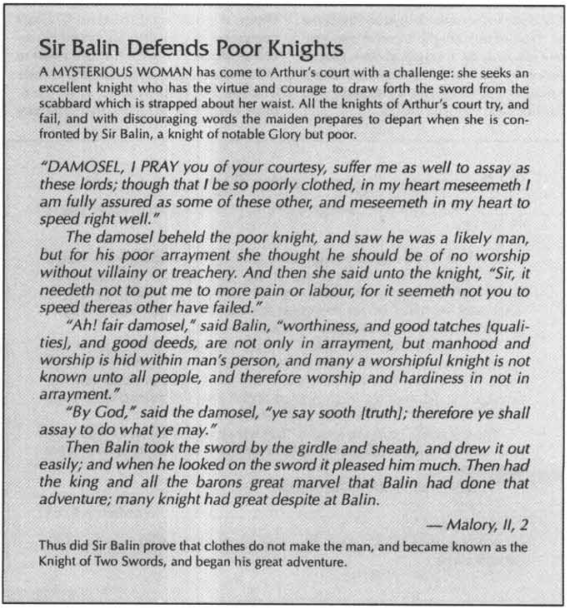
See? Told you. Okay, so I paraphrased a bit. Deal with it.
Quality is not about being a good knight; quality is about being a well-financed knight. There are five classes of knight - Impoverished, Poor, Ordinary, Rich, and Superlative. Where you fall on that scale depends on how much cash you spend on maintenance for the year - your purchases of food, new armor and/or repairs to armor, feed for your horse, home repairs, et cetera. It costs 6L to maintain yourself as an Ordinary Knight. Depending where you fall on this scale you may have penalties or bonuses on some of your Winter Phase rolls (Impoverished Knights have a much harder time keeping their horses alive, for instance), and Rich or Superlative knights gain additional Glory each year, one point for every additional Librum spent in their maintenance (so by maintaining a knight with 21 Librum for a year they gain 15 Glory). Lords who supply their maintenance also get this Glory.
It is worth noting here that without getting into the more advanced land-management systems in the supplement Lordly Domains , it is typically assumed in Pendragon that a knight will be given a small parcel of land and a Manor to rule. This Manor, after taxes and maintenance and duties to the lord, produces 6L. Basically this whole system exists specifically to be easily bypassed ; it's very easy, and in fact encouraged, to give a knight a Manor so that he won't have to care about his maintenance and that way you don't have to worry about things like "do we have enough rations for our trip to Camelot?" or any of that crap and you can concentrate on being Knightly. If you like the nitty-gritty of running a demense you can, but if you find that crap dull it's okay.
(I do intend to talk about Lordly Domains , probably right after I finish the core book, because there's a lot of detail about how the feudal system actually works in there; the fifth edition equivalent is not in my collection, sadly)
Knights are, of course, nobles - but there are degrees of nobility, some of which a PC can hope to achieve. So that means let's talk about Nobles and Noble Ranks .
Vassal Knights we've discussed before; these are Knights who manage a Manor or two for their lord. This is the lowest rank of land-owning nobility.
The lowest rank of true lordship, in the sense of having noble vassals of one's own, is the Banneret . I already talked about these guys too, briefly; these guys are still a knight, but they have other knights that answer to them. They have been given a large number of manors, and hand them out to their vassals.
Barons are next up, and now we're getting into the ranks most people think of when they think "nobility;" in Pendragon, a Baron commands the fealty of at least 25 knights, some of which are bannerets who command knights of their own. Barons must hold a Hunt when asked by his Lord and hold a small Neighborhood Tourney once a year. They are the first noble class entitled to awesome headwear, being allowed a small crown with eight pearls.
Earls , or Counts , which are the same damn thing and this always confused me growing up ('Earl' is an Anglicization of the Saxon 'Jarl'). Earls control Counties, which are large swathes of land; most Earls also control land in other Counties as well. They command roughly fifty knights, and must hold a Hunt and a Feast when commanded, as well as a Local Tournament once per year. They may wear a crown with eight strawberry leaves interspersed with eight pearls on metal spikes.
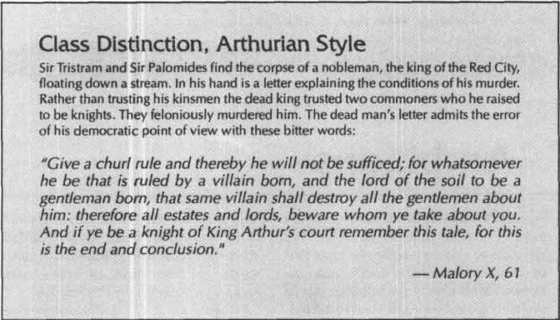
Arthurian tales weren't real big on the notion of class mobility.
Dukes are the highest rank of nobility aside from royalty. They command at least a hundred knights and must live as a Superlative Knight. They must hold a Hunt, a Feast, and a Court yearly, as well as a Regional Tournament. They may wear a crown with eight rising strawberry leaves.
Kings are, you know, Kings. Do you need me to explain this?
There is one rank of nobility that, as far as I know (and if I'm wrong feel free to correct me!), was invented for the game, called a Pennath . A Pennath is basically "anyone who doesn't owe fealty to anyone higher in rank than them," and often style themselves as Kings despite controlling a 'Kingdom' that is tiny or weak. This is basically the way the game makes sense of the fact that within the canon there are multiple 'Kings' of Gomeret or Norgales.
For knights that can't manage to become higher nobility, there's always the option to try and become an Officer - an important post serving one's lord. These are typically too demanding to allow for adventure, so they may not be suitable for PCs. Possible Officer roles include:
The Chancellor , the number-two man within a realm, who holds the Royal (or ducal or whatever) Seal which must be affixed to all official documents; Arthur's Chancellor is Constantine, son of Cador.
The Butler is responsible for food - its procurement and storage, the hiring and oversight of workers, carters, servants, et cetera. Lucan the Butler serves this role for Arthur.
The Seneschal , or Steward, is the man in charge of feeding a castle - especially the parts of feeding that take place between storage and the plate. He is the lord over the cooks and the dishwashers and the servers. Sir Kay, son of Ector, serves as Seneschal for his foster-brother Arthur.
The Chamberlain is the keeper of the King's Chamber - and the things in it, which include treasure. He is the chief servant of the King's private life and his treasurer as well.
Constables are in charge of the order and comfort of the court, securing lodging, hiring watchmen, musicians, et cetera. Sir Baudwin of Britain (also Bishop Baudwin of Britain) holds this office for Arthur.
The Marshal is the primary war leader of a realm. Arthur's Marshal is at first Sir Brastias, and later Sir Griflet.
The Justiciar is the overseer of the King's Justice and magistrates, and is responsible for bringing cases before the King for judgment. King Arthur has no Justiciar, preferring to oversee this post himself.
There are other possible titles, as well, from Sheriff to Bretwalda (the Saxon equivalent to High King) to Vavasour (strictly "vassal of a vassal," usually appearing in stories as a kindly old retired knight who aids the hero and typically has a beautiful daughter).
This is going on forever, so we'll get to Ideals - Chivalry, Romance, et cetera - and Orders - the Round Table is one - in the next post. Until then, have some art. Art in this book is pretty sparse on the ground, so when I find good stuff I try to share.
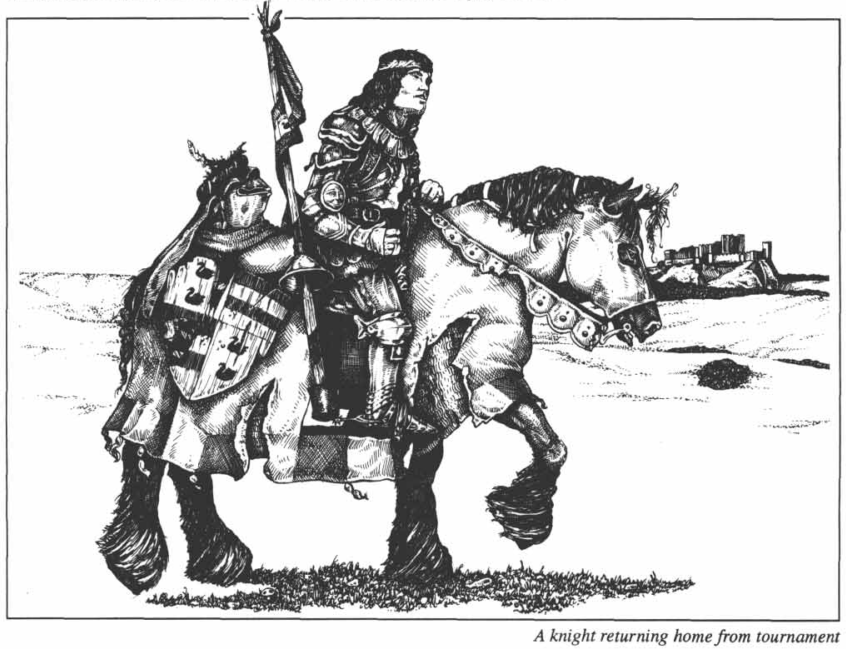
Ideals
Original SA post
Okay. Are we finally going to get through this relatively short chapter today? Let's find out!
The biggest Ambition most knights will have aside from achieving higher office will be to live up to certain Ideals . We've talked about these a bit, but this is the section devoted to them.
The first - and some would argue foremost - of the Ideals is to live as a Chivalrous Knight . In the Pendragon history, chivalry is introduced to Britain by King Arthur early in his reign; depending on one's source, there may be some resistance to adopt the new ideals by the knights of Britain (chivalry, like jousting, is readily dismissed as 'a French thing'), but by the middle of Arthur's reign it is in vogue, and every true knight strives to act chivalrously - and to spread chivalry through the simple method of beating the shit out of everyone who doesn't subscribe to it.
(This is not an exaggeration. Several times, in the canon, Arthur's knights find some distinctly unchivalrous knights, defeat them soundly, and thus open their eyes to the wonder of chivalry, causing them to try and be better people from then on. Part of playing Pendragon effectively is accepting that logic and 'normal' emotions really aren't appropriate.)
The reason chivalry is such a big deal is that before its introduction, Britain was ruled pretty much on the principle that might makes right - a notion that persists throughout Pendragon, but at least the introduction of chivalry injects a sense of noblesse oblige, the notion that maybe all these peasants and lessers deserve to live.
To be a Chivalrous Knight one must qualify for the Chivalry Bonus discussed earlier; their duties are simple. "A chivalrous knight must use his skills to protect the weak, spread culture and civilization, and uphold the law of the land. He must strive to bring the King’s justice to all." In exchange for this, they get the Armor of Honor - three points of armor, all the time - and 100 Glory per year.
The next most common Ideal is to act as a Romantic Knight . This one gets a little tricky.
Queen Guenever, as mentioned earlier, introduced the notion of Courtly Love, or fine amor, to Britain shortly after becoming Arthur's Queen. Romance has become a formalized affair, as opposed to the earlier "you're cute, let's shack up" process that was once standard.
In practical terms, this means that wooing a lady is a lot trickier. Now, because I know some of you are wondering (sigh), that doesn't mean a character can't just shack up with someone; passionate affairs are in fact well represented in the canon. That, however, is not Courtly Romance - and doesn't provide any benefits (well, mechanically speaking; I'm sure it provides benefits in other ways you sick little monkey).
quote:
Characters must have a lover to qualify for Glory through romance. The precise nature of the amorous affair is shaped by the individuals involved. Given here are some typical examples, which are by no means exclusive to your imaginations.
He must have five of the following skills at 10 or more: Compose, Dance, Falconry, Flirting, Game, Intrigue, Orate, Play (Harp), Read (Latin), Sing, and Tourney. The lady, of course, decides which five.
Further requirements are that a knight must prove his passion for his lady at least once per year by doing her bidding, occasionally even under duress. This activity must be played out, or done solitaire using the Lover’s Solo (see the "Scenarios" chapter). A knight must also entertain his amor with presents equaling at least one full Librum per year.
Now, a Romantic Knight has other duties - they must honor women and protect them, show them courtesy and honor, and he must be faithful. This applies even when his love is not publicly known; it is entirely possible to carry on a secret courtship and/or affair. Even while secret, though, the knight (and his lady) will gain Glory, as the effects of his amor will still be visible to all and sundry, kind of like that time you had a crush on the cute girl in your math class and walked around smiling all the time and all your friends started making fun of you.
Success at Amor gains a knight 50 Glory in its first year - 100 in the second, 150 in the third, et cetera. Now, obviously that adds up, and fast - my group had a house rule that said that once a romance ends - in marriage, death, discovery, whatever - the Glory rewards end; marriage, of course, brings its own rewards in Pendragon.
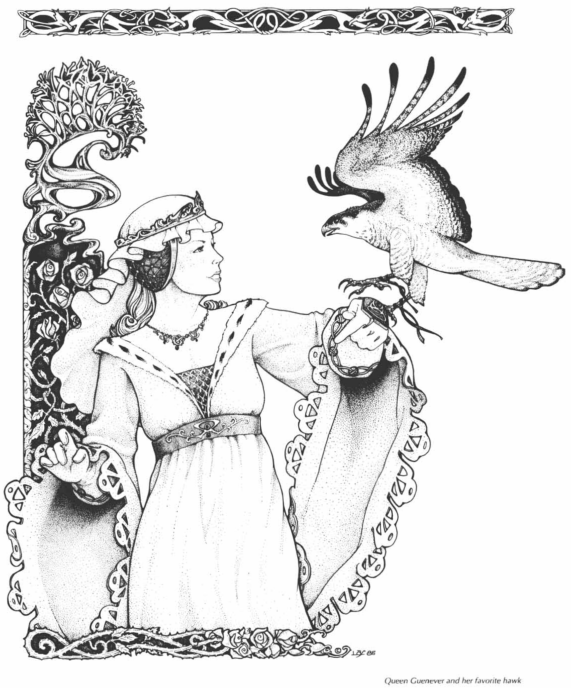
We're low on art here, so have a nice image of the Queen.
So what's next? Ah. Companions of Arthur. Remember these guys? Arthur's Companions are knights who have sworn to uphold Arthur's ideals and spread his rule and who have pledged fealty directly to him. A Companion, when asked, can call himself "King Arthur's man" no matter who his actual liege lord might be.
To become a Companion, a knight must impress a Round Table Knight; this is left up to the gamemaster, largely, who will have the RTK 'test' the knight for worthiness.
quote:
Desirable areas include the traits of Energetic, Generous, Honest, Just, Merciful, Modest, and Valorous, and the passions of Loyalty, Honor, and Amor (Lady). If five or more of these have a value of 16 or better, the test is passed. If less than five have a value of 16 or better, and any have a value of 4 or less, the test is failed.
Otherwise the gamemaster must make a decision in character, as the Round Table knight (probably Sir Gawaine) administering the test. Requesting a speech about Arthur’s ideals from the player is a fair and entertaining solution to the problem, with a good speech permitting the test to be passed.
Now, being a Companion is not an "official post" per se; it's a strictly informal brotherhood, so one need not assume any particular duties, but a knight should strive to uphold Arthur's ideals at all times. The knight gets 100 Glory for swearing the oath, and may receive more assistance from NPCs than other knights might.
Christian Knights get an entry, though religious knights of other faiths do not, interestingly enough. Still, it's easy enough to extrapolate this stuff for pagans or Wotanic knights or whatever - largely because there's no particular details on duties or expectations. If you embody your religious virtues to the point that you are famous for them, you qualify for your religious bonus and 100 Glory per year.
Lastly, there is of course the possibility of becoming a Round Table Knight . This is, to put it mildly, A Big Deal. There are 150 seats on the Round Table, and some of them are empty at any given time.
RTKs must be chivalrous knights; other than that, the GM decides when a character qualifies. No one gets on the Round Table without being a grade-A badass, so keep that in mind. The character swears the following oath:
quote:
"I swear, by the honor done me by my lord Arthur and the Table Round, to
never commit violence without good purpose, to shun all murder and treason, and to give mercy where it is asked. I swear, upon pain of death, to always protect ladies, gentlewomen, damsels, and widows. I promise to never fight for an unjust cause, and to never fight for personal gain."
A newly-minted RTK is eligible to wear the green garter (belt) of the Round Table and receives 1000 Glory. Also you're pretty much famous and everyone loves you.
There are lesser organizations as well - the Queen's Knights , who serve as the Queen's bodyguard; the Knights of the Grail Temple , a fellowship of monastic christian knights; the Order of the Golden Apple , formed by the King of Malahaut to ape the Round Table; The Thrashers , taken from T.H. White's The Once and Future King , an organization of malcontents led by Sir Mordred; The New Celts , Cymric patriots who aren't thrilled with the cultural equality inherent in Arthur's reign; the Order of the Red Knights , who all wear red armor and believe that violence is inherent to knighthood (and who are admittedly something of a tongue-in-cheek kludge to make sense of the various Red Knights that crop up from time to time in the canon, usually as villains); and the Young Knights , who are pretty much Arthur's Official Fan Club. Most of these minor organizations are created for the game rather than existing in canon.
There are also sections on creating one's own fellowship, playing as a squire, or playing as a knight errant; they are short and not that exciting and I'm skipping them because I've been on this chapter forever.
Next time: Women ! Oh, yeah, it's that time. Let me just apologize in advance, ladies.
Women
Original SA post
The chapter I've been half-dreading since starting...

You know you're in for something good when the chapter opens with "PENDRAGON IS BASED on Arthurian literature. To be faithful to the sources the role of female characters must be limited to those roles found in literature and history." Let's just get that justification out of the way pronto! To be fair, they follow that up with a note about how they hope to broaden some of those roles a bit, but still, there's no way around it - Pendragon is not a game that's big on gender equality.
This is one of those instances where the faithfulness to the source material can bite a game in the ass. There are things Pendragon simply doesn't do well, like female PCs or - as brought up earlier in the thread - PCs that don't buy into the normal social constructs of feudalism. The tradeoff being, of course, that the things it's designed to do - namely, playing a knight in the Mallory-ian vein - it does very well. It's something that no review should ignore, though, and folks interested in the game should know about it in advance.
Women in Pendragon are divided into three groups - ordinary women, important women, and extraordinary women. This is a pretty nonsensical division and will promptly be ignored - hell, it doesn't even really show up in the rest of the chapter.
Women, like men, have Ambitions; traditional ambitions for female PCs include "Wife, mother (widow)" and "lover" and "heiress" and "nun." You may note that none of these roles really provides a ton of support for having adventures - or, indeed, leaving the house.
In a sidebar there are rules for female chargen; naturally, they get different statistic rolls than men do.
 Female characters get, rather than the Family Characteristics bonus that men get, a "Women's Gifts" table. Instead of giving bonuses to a skill, the Women's Gifts table grants bonuses like "+1d10 APP" (the only time in the entire game you'll see a d10 roll!) or "Good With Animals" or "Make Potions."
Female characters get, rather than the Family Characteristics bonus that men get, a "Women's Gifts" table. Instead of giving bonuses to a skill, the Women's Gifts table grants bonuses like "+1d10 APP" (the only time in the entire game you'll see a d10 roll!) or "Good With Animals" or "Make Potions."
The next section is a bit brighter: Warrior Women.
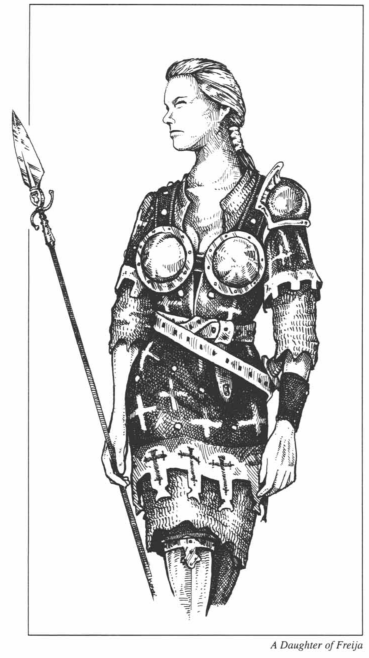
The minstrels and troubadours that popularized Arthurian myth created a very idealized version of their society, but there were historical examples of less-traditional ladies that were known at the same time, examples like Sigelgaita of Sicily and Joan of Arc and Duchess Constance of Brittany.
The game then goes on to note that maybe the lack of female warriors in Arthurian stories is possibly less than surprising considering that many of these stories were being written at a time when society had only really sort of begun to consider that possibly, maybe, women might be more than just baby dispensers.
In the end, the degree of acceptance for female warriors is up to the individual GM. Society could be considered reluctant to permit woman warriors, or open-minded about it, or somewhere in-between. The game also suggests that a good route for a female PC to take might be to play a woman warrior disguised as a knight; if the woman's ruse is discovered and they have earned about a thousand Glory, her status ought to have enough weight that she could potentially find a Lord to knight her.
Two non-traditional groups are then presented, Boadicea's Daughters and Freija's Women, which are societies of female warriors which could be encountered in-game and could provide a support structure for women warriors.
...actually that chapter wasn't quite as objectionable as I remember. The chargen rules could use an explicit "if creating a women warrior use the same chargen as a man" rule (it's never stated that one should do this but it really oughta be), but otherwise it... well, it coulda been a lot worse.
Next time: Game Mechanics ! Holy crap I can talk about how to do stuff now yay!
Game Mechanics
Original SA post
I am returned from Time With The In-Laws, which means you get more...


aka "Actually Doing Shit." I've discussed a lot of the basic mechanics in previous posts but we'll get all of them in a giant mega-post now. Some basic concepts:
Attributes of 10 are considered fairly average and mediocre. Attributes of 15 or more are considered superior, and 20+ is heroic stuff of legends levels. Shame that's not mentioned in the chargen section.
The game talks about rolling dice to check your skills and see if you succeed but does not yet explicitly mention what constitutes a successful roll. This would be no big deal if it weren't in the section that theoretically explains this stuff. I... guess we'll see it later? Oh, okay, we actually see it on the next page under "Resolution." Phew, I thought the layout was even worse than I remembered for a minute there.
The game also talks about
experience checks
here, and I don't know that I've mentioned this before. Remember how on the character sheet there were all those little empty squares next to your skills and traits and stuff? Those are for experience checks. If you crit a roll, or if you use a skill often during an adventure, or if the GM decides you've earned it by being clever, or even if you happen to encounter something that's vaguely inspiring (encountering an Allegorical Beast, for one - for instance, there was a legend that a Coot (a type of bird) would build its nests below the nests of eagles, and if a young eagle was rejected from its nest the coots would take it in and raise it to adulthood themselves), you get an experience check to the trait or skill or passion involved (in the case of observing a coot raising a baby eagle, the viewer gets a Generous check
gratis
). Experience checks are, obviously, one means by which one might raise a score, and they are handled during the Winter Phase (we'll get there eventually).
Resolution - the Complete Doing Stuff With Rolls portion of the book. Finally, some crunch to go with the copious fluff. I've discussed resolution a bit in the past, but it's worth going over again here:
To resolve a skill,
you roll a d20. If your roll is
less than
your skill rating, you have succeeded. Modifiers may adjust your skill below 1 (in which case you cannot succeed) or above 19 (in which case you cannot fail), but you should still roll in case there's a crit.
If you roll a 20, and your score is 19 or less,
you have a critical failure. This is usually not crippling but is generally bad news - this is the territory of broken weapons and lamed horses.
If your roll is equal to your rating,
you have achieved a critical success. If your rating is 1, you achieve a critical success even on a roll of 1 (meaning you only succeed one time in twenty but when you do it's
awesome
). If your rating is 20 and you roll a 20, it is a critical success, not a critical failure;
critical success rules trump fumble rules
.
If a modifier raises your rating to a number greater than 20,
you roll against a score of 20 and add any 'extra' points to your roll rather than your score. For example, a character with Flirting 24 rolls against a score of 20 but adds 4 points to his roll.
In this case any roll that is a modified 20 or more is a critical success
(so in our example, the master flirt would crit on a roll of 16 or higher).
When two characters are acting in opposition,
they both roll their applicable skill and compare results; the
higher successful roll
succeeds. Examples:
-
Sir Alan and Sir Bob are fighting with swords; they both have Sword 10. Alan rolls 5, Bob rolls 19. Alan has the highest successful roll, as Bob failed; Alan hits Bob.
-
If Alan rolled 9 and Bob rolled 8, both succeeded, but Alan's roll was higher, so he hits Bob. As Bob's roll was still a success he achieves a
partial success
, which should have some positive benefit; in combat, for instance, it means he is permitted to use his shield to deflect the blow.
-
If Alan rolled 11 and Bob rolled 17, both have failed, so neither man hits the other. Time passes, and that's it.
-
If Alan rolled 7 and Bob rolled 7, they have tied; in the case of a tie, both succeed equally well and so neither man hits the other. Time passes. There may be special rules for ties in combat (weapons breaking, et cetera), but that's it.
Lastly, Negative modifiers cannot drop a score below 0. A character suffering a -15 to his Sword Skill of 10 has an effective skill of 0, not -5. He cannot succeed, though he should still roll to see if he fumbles on a 20 - but he does not get an increased chance to fumble.
The game starts talking about Time Scales now, and much of it is the usual dull "Narrative time/battle rounds/etc." stuff, which I will ignore, with one exception:
The game of Pendragon assumes one scenario or adventure per calendar year .
The reasoning here is fourfold (quadfold?). One, much of a knight's time is not his own - he has to do his duties for his lord and attend court and see to his land holdings and blah blah blah, which doesn't leave him a ton of time to go off and have adventures. Two, this speed of play makes the dynastic segment - have kids, have your kids become knights, et cetera - more important, and besides, death in Pendragon can be fairly common, since Pendragon does not feature much in the way of magical healing... which also makes the dynastic segment of the game important. Three, the goal of the game is Glory, and Glory is only really accumulated when a knight's deeds have had time to become legend. A speedy passage of time makes this happen in a reasonable timeframe. And four, Pendragon characters get better at stuff pretty damned fast, and aging them out is generally not a bad idea. This doesn't mean a well-designed and Glorious character can't live until age 70 or so and still kick ass the whole time - hell, Arthur does - but it's nice to have a choice.
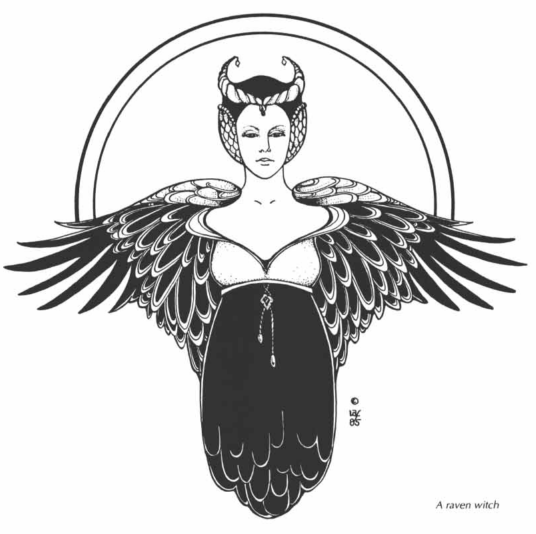
I have no idea what this here Raven Witch has to do with anything in this chapter but here she is anyways and given the dearth of art I bring her to you in the interest of breaking up the textwall.
Now we get to the Experience section. The stuff I mentioned above for experience checks? It's repeated here. The author goes out of his way to note that while succeeding at a skill may give a check, it doesn't have to, and it's always the GM's call; a crit is always a check but a regular ol' success isn't unless it is somehow noteworthy.
There's then a section on Movement , which is frankly kinda dull. There is discussion of different types of roads and "scenario movement" versus "combat movement" et cetera, which seems a little out of place - it's far more appropriate to a minis-centric tactical game than the otherwise fluff-heavy Pendragon. This section also has a subsection on The DEX Roll and many of the interesting things it can be used for like throwing things and jumping that is probably placed here simply because there was no where better for it.
And then, finally, that most knightly of endeavors, Combat .
I've gone over bits and pieces of combat before - weapon types, for instance, is a section I don't plan on replicating. But there's a lot I haven't gotten to.
For instance: Armor . I've mentioned armor before, especially in relation to the Armor of Honor granted by Chivalry, but I haven't explained how it works. Here's how it works. Your armor value is subtracted from any incoming damage . A character wearing, say, Norman Chainmail - 10 points of armor - and carrying a shield, which counts for 6 more points of armor, who receives a blow for 18 points of damage subtracts 16 from that blow, taking instead a much more manageable 2 points.
If a character takes more damage before armor than his Knockdown rating - his SIZ - then he is off-balance. He gets a chance to make a DEX roll to stay on his feet; otherwise, he falls over. The DEX roll doesn't take an action. Note that heavier armor has DEX penalties associated with it! This is one reason the Saxons - with their cultural SIZ bonus - are so nasty; it's harder for them to be knocked off their feet! While knocked down, a character can stand in the next round without needing a DEX roll, but they get a -5 to their weapon skill for that round while their attacker gets a +5.
If, after armor is applied, a character takes damage equal to or greater than his Major Wound threshold then he gets (surprise!) a Major Wound. Those suck and you don't want 'em.
There are lots and lots of combat rules, and I'm not going to summarize them all. Stuff like attack-trained mounts that can trample enemies and lance charges and fighting without armor and special combat tactics; all neat stuff, but seriously, go buy the book. :101:
There's a more in-depth explanation of each of the Skills next, both non-combat and combat; I don't think it's necessary to give more than the brief summaries I already have.
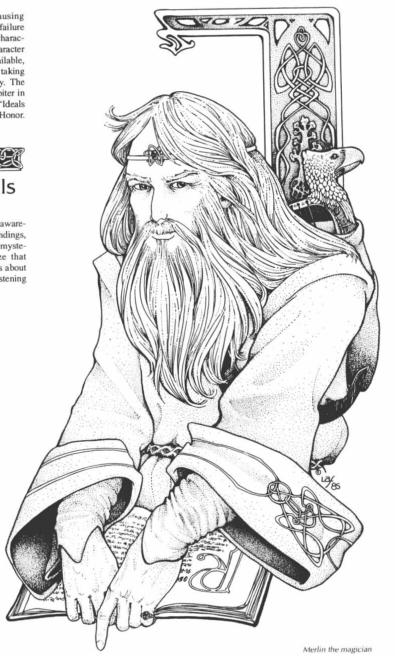
Hey, look, it's Merlin!
Injury and Health comes next, and this stuff matters. See, it's not hard to get hurt in Pendragon. It's not hard to get badly hurt in Pendragon. It is hard to get back up and soldier on afterwards.
See, each character has a Healing Rate. That Rate is the number of hitpoints a character heals naturally per week , which happens arbitrarily at noon on Sunday (yes, it is better to get hurt on Saturday than Monday if you don't want to carry wounds around).
You may have noticed that most characters don't have very large Healing Rates. After a serious battle, even if the character takes no Major Wounds, he's probably still running around with half a dozen minor wounds, which may take months to completely heal. There are healing potions, of course... if you're lucky enough to have one (and you probably won't be, because typically you earn them in chargen and that's all ).
If a character takes enough wounds, minor or major, to drop below their Unconscious threshold (one quarter of their HP), then they fall down and take a nap. They get a DEX roll to fall safely, but otherwise may slump off of their horses in the middle of combat. Any character so badly harmed will require Chirurgery (check the "Chirurgery Needed" box; any character with this box checked is referred to as unhealthy ).
If a character takes a Major Wound (remember those?) they may be up shit's creek. They make a roll against their current remaining HP to stay conscious; if they manage to stay conscious and they want to keep doing shit they may need to make a Valorous check; they immediately make a roll on the Statistics Lost table from the Winter Phase (we'll get there!) to signify the wound's lasting effects; they will require Chirurgery; if they keep doing anything they may be subject to aggravation and deterioration, which can result in further HP loss or statistic loss.
Oh, and if HP drops to 0 you probably die. Duh. If First Aid is applied immediately, so that the character's HP become positive again before midnight (don't get badly wounded at quarter to twelve), then you'll survive but otherwise it sucks to be you.
Speaking of First Aid, let's talk about that. First, though, we have to talk about how you record your wounds.
See, you don't just mark lost HP off in a single chunk; the way Pendragon wounds work, you have to mark each wound separately, so that if you have 30 HP and then you get hit for 2 points three times, your sheet should look like this:
- Total HP: 30 Current HP: 24 Wounds: -2 -2 -2
The reason you do this is because First Aid is applied per wound . First Aid can be applied for each of your wounds; success restores 1d3 HP (a crit restores 1d3+3). First Aid can only be applied once per wound, so that a 2 point wound that heals 1 point per First Aid leaves 1 point that must heal normally - and a 2 point wound that receives 3 points of First Aid goes away, but that 'extra' point of healing is lost.
Now, what about Chirurgery? Chirurgery is basically medieval surgery, and as you can imagine, it kinda sucks. See, an unhealthy character can be subject to deterioration or aggravation, as mentioned earlier, if they do anything more strenuous than lie in bed and maybe take a slow walk around the yard. Chirurgery can negate this. A successful Chirurgery roll will keep a patient from suffering aggravation or deterioration, and a crit will double their Healing Rate for the week... but a failure will automatically make them suffer deterioration, and a fumble does the same and adds more HP loss on top of that.
(for clarity - aggravation is HP loss due to performing strenuous activity while already injured; deterioration is HP loss suffered by not getting a successful chirurgery roll. First Aid cannot be applied to either.)
That's enough for today, I think; next time - The Winter Phase! I told you we'd get there eventually.
The Winter Phase
Original SA post
We're still in the Game Mechanics section, but we've finally hit the Winter Phase . Told you!
Winter in Arthurian Britain pretty much sucks and no one goes anywhere because all the roads have snow on them and suchlike. It's all downtime. Now, from a gameplay perspective, having a chunk of guaranteed downtime is actually pretty handy, because it's a good place to put all the bookkeeping crunch for an entire game year.
The Winter Phase has nine steps. The first is Perform Solo - this is the opportunity for the GM to run a little mini-adventure for each individual PC, ranging from The Lovers' Solo (detailing a PC's attempts to sleep with a woman, only, you know, all courtly-like) to "Hey, bandits attacked your Manor, go kill 'em." Solos are pretty strictly optional and typically very short, but a good GM can do a lot with them.
Step Two is where we start seeing some crunch, when we Perform Experience Check Rolls . Remember Experience Checks? This is where we see whether they turn into stat increases. For each checked Skill, Trait, or Passion, you roll a d20; if the result is greater than the stat's current value, then the PC has managed to learn from their experiences and increases the stat by 1. A roll of 20 always increases a checked stat, even if the stat is at 20 or more. It's easy to increase a low stat this way, harder to increase a high one - as it should be.
Step Three is Aging . We've talked about this a bit. All aging occurs during the Winter Phase (except for aging caused by major wounds, which occur immediately), meaning that, yes, every character can be assumed to have a birthday in January or February (as we'll see later, all childbirth happens in the Winter Phase too). Every character who is 35 or older rolls for Aging, and there are two charts. The first one tells us how many times we have to roll on the second chart - ranging from 4 to 0 - and the second chart tells us which statistic we lost one point from (though there is a 'no loss' result there, too). Getting old sucks.
Step Four? Check Economic Circumstances. This is where we spend our money for maintenance - remember the whole 'impoverished knight/rich knight' thing? Yep, that. If we have extra money we can maintain ourselves more readily; if not, we can't. Our maintenance class determines whether we get bonuses or penalties on future Winter Phase rolls. Oh, also, clothing's value is cut in half every Winter, due to wear and tear or going out of style or whatever.
Step Five is Stable Rolls . For each horse a knight owns, roll 1d20; a 1 or 2 means the horse died. Sorry, sucks to be you. If you're a Superlative Knight you get +2 to all rolls on this table so all horses survive, but at that point you can probably just buy new horses anyways, what do you care? It sucks if you're a poorer knight and your prize Charger or Destrier - expensive war-trained horses - die and you can't afford a new one. Jousting on a cart horse doesn't work out so well.
Step Six is for Family Rolls . There are a number of rolls to be made here - if you don't care about Romance you can just ask your liege to find you a suitable wife, and if you do, poof! Here's where you get her. There are two ways to go here - either marrying below your character's station, which requires only a simple Loyalty (Lord) check and suddenly poof! You're married to a handmaiden or a knight's younger sister or whatever. She's entirely unremarkable and has a small dowry but she'll pump out kids. There's also a slightly more complex system to find a wife who is more at your social class, one who has manors and Glory 5f her own, which may take longer. It's basically a system for players to ensure that their PCs will have heirs if they don't feel like taking part in the sometimes lengthy and time-consuming - and for some players embarrassing - Romance systems.
There are also rolls for Childbirth (if you're really worried about having kids, there are actually rules for keeping a mistress, and she rolls here too), Child Survival (hey, kids get pneumonia), and Family Events (deaths, marriages, births, scandals, whatever).
Step Seven is Training and Practice , which is fundamentally identical to the aging process in chargen; you can add a small (1d6) number of skill points without raising any skill above 15, you can add a single point to any skill at 15 or more (up to 20), or you can add one point to any statistic, trait, or passion.
Step Eight is Compute Glory . As mentioned earlier, Glory takes time to spread; when you achieve a Glorious success, it still takes time for people to hear about it and afford you the appropriate respect. As such, when gaining Glory during an adventure, you don't add the points directly to your total - you add them to the "Glory This Game" total on the character sheet, and it's only during the Winter Phase that you add them to your total Glory.
Yes, this means a 1200 Glory knight can achieve 3000 points of Glory (somehow) in May and yet he's still treated as a 1200 Glory knight until the winter comes; the tales of his great Glory are still being composed and spread throughout the land.
Step Nine is Add Glory Bonus Points . Every time your total Glory ticks over into a new thousand - going from 2900 to 3200, for example - you gain a Bonus Point. This is a single point that can be added to any number on your character sheet without restriction - you can even use it to boost your SIZ if you're older than 21, despite the fact that that makes almost no sense and you can't do it any other way. It's magic.
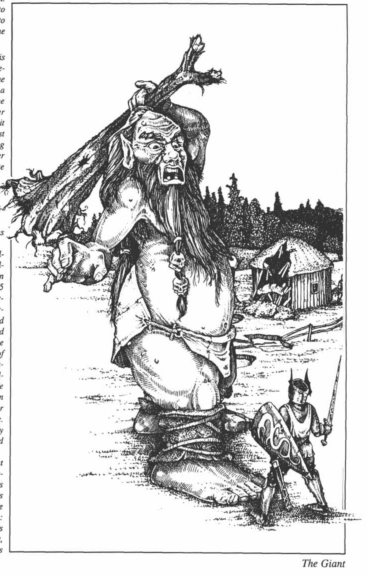
Random giant picture.
And that's the Winter Phase - all of your bookkeeping and character improvement needs in one tidy package. Simple, right? I actually really like this aspect of Pendragon, for all that the logic is a little strained (yes, your birthday is in the winter, everyone's is). By designating a time for all this stuff to happen - a time that makes sense within the setting, even - the rest of a game session can be devoted to going off and adventuring. It's a bit of a kludge, but a kludge that, in my opinion, works out really well.
Ideals & Passions
Original SA post
Okay, we're still not done yet, and now that I'm over the Peruvian Death Flu or whatever the hell it was that's had me ill for a week, I can concentrate enough to post.
The next chapter is Ideals and Passions . Much of what's here has been talked about already, but not in much detail. I don't feel the need to summarize too much of what's here, but I should point out that whenever an appropriate Trait or Passion might be tested, a character with a Famous Trait - that is, one of 16 or more - must test it.
So, for example, if a group of knights is riding down the road and sees an attractive maiden who suggests that they set their quest aside for a bit and join her for lunch, and - being a wicked sort who hopes to tempt the knights away from their quest - drops flirtatious innuendo in the process, a Knight with a Lustful score of 10 could simply ignore her, or, if he thought his character might be tempted (or he thought it could lead to an interesting adventure) he could choose to roll... but a knight with a Lustful of 16 must roll, will probably succeed, and thus he's probably setting the quest aside for a bit because, you know, boobies.
(Other PCs may attempt to prevent him from doing so, but if they start quoting the bit from Monty Python and the Quest for the Holy Grail about how it's much too treacherous, I for one think they need a flogging)
The book actually makes a point of saying how PCs aren't supposed to be evil or wicked, but by playing up personality flaws like this the GM can introduce conflict that doesn't have the attendant dangers of combat.
If a Character Trait roll is failed, the player should then roll on the opposing trait (so a failed Energetic roll sparks a Lazy roll). If both rolls are failed, the player can choose their actions freely, but will not get an experience check for either trait.
Some players will hate this ("I don't care if I did roll a 2, I didn't want my character to act Selfish!"), and that's okay - they can ignore the whole Traits section if they and the GM are cool with that. They're intended to be tools to support and enrich one's gameplay rather than limit it. A good guideline, in my experience, is that a player's desires for their PC should always be paramount, but rolling Traits is a great way to decide what to do when a player is stuck or indecisive.
Then there's stuff about Directed Traits and Passions that we've already discussed and I have no desire to type again, et cetera... oh, but there's one thing I should note. Namely, Passions are an exception to the normal statistic growth rules.
When a skill or a trait is critted, one gains an automatic experience check. For Passions, however, one gains a check for any successful roll . A Critical success on a Passion gives you a check and increases the Passion by one immediately and permanently , and a failed Passion roll immediately loses one point unless the GM says otherwise; a fumbled roll will always lose a point.
This is the only exception, so far as I know, to the rule that statistics only increase or decrease during the Winter Phase.
The results of failed Passion rolls can be pretty brutal. If a character rolls a Passion for an activity that the GM deems "frivolous" ("I want to be Inspired by my Love (family) to win this drinking contest, so that all the other people here will remember my family name!") and then they fail to achieve their goal ("sorry, dude, you pass out after the fifth tankard of booze"), they receive a Shock - an immediate roll on the Aging Table.
Failed Passion rolls leave a knight Disheartened - he is at -5 to everything. Sucks to be you! There are also rules for Melancholy and Madness and the typical over-the-top drama bullshit one sees a lot in the canon.
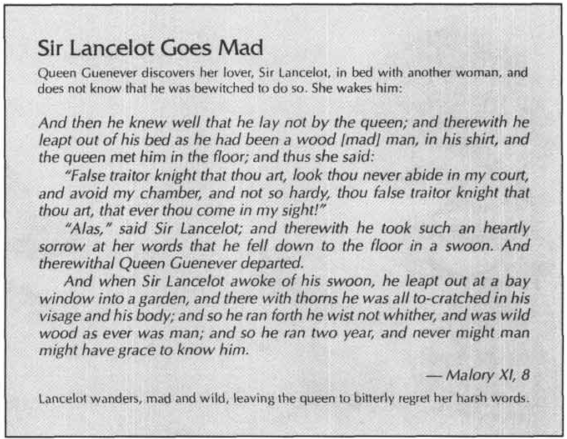
When the woman you love yells at you, it's not enough to say 'eh, chicks, right?' No, you wander naked in the woods for a while.
Our next chapter is on Religion in Pendragon. Long story short:
Christianity is pretty much what you'd expect; there is only one Christian church, as the Protestant Reformation hasn't happened yet, though Celtic Christianity is more decentralized than Roman Christianity and Irish Christianity and Grail Christianity are also things that exist but mostly you need not give a damn.
Paganism is... okay, look. There's no way around it. Paganism, in Pendragon, is basically what Wicca wanted to be before college kids found it and decided it was a good way to piss off their parents. There's talk of many gods and goddesses but also a Mother Goddess which is given many names and the Holy Grail is actually the Goddess' Cauldron and blah-de-blah. I was actually a practicing Wiccan for a time, and suffice it to say they're pretty much the same thing. How cool and/or stupid you find that is up to you, basically.
Wotanism is the Saxon Religion. It worships Wotan. I don't think I need to explain to you how awesome that is. There is a lot of yelling "RRRAAAAAARRRRRRRRGGGHHHH" and cleaving your foes in twain with axes.
Judaism is, you know, Judaism. It doesn't come up much in Pendragon, considering that Pendragon is a game set to evoke a time in history and myth when the Jews weren't exactly well-beloved; still, a section of southern France is thought to be largely Jewish (the County of Narbonne, to be exact), and so it is included in the game. There isn't a whole lot of detail given regarding the religion of Judaism, but then not much is needed; for Pendragon purposes, assume the modern faith applies. Poof, done.
Interestingly, the book doesn't include a section on the Shamanism practiced by the Picts. Maybe that comes up in Beyond the Wall ? Well, we'll see when we reach that book.
Oh, and there's a sidebar about Evil as well - as separate from being merely a villain, being well and truly Evil is an option for certain NPCs - The Knight of the Dragon fought by Percival is best understood as being exactly what he claims to be, a knight-sorceror who sold his soul to the Devil. Qualifying for an "Evil Religious Bonus" could give an NPC certain benefits (immunity to flame or a fire-breathing steed or what have you) but will also always include some inescapable downfall and/or diabolic recall.
The next chapter is entitled Your Home and is all about Salisbury, for characters created using Beginner Chargen. I'm skipping it, because while it's a neat look at a single region it's got more detail than I want to cover in the core book overview. So I'll call it here, and hit the chapter on Wealth next time.
Wealth & Swearing
Original SA post
Hey, you know what I haven't done in a while?

So we've hit the chapter on
Wealth
, which the book tells us is "one of the measures of being a knight." Though actually, the introductory paragraph tells us... you don't have to pay a damned bit of attention to it.
See, most knights get their upkeep paid by their liege. That upkeep is generally 6 Librum/year - and one Librum is roughly equivalent to "the sum total of wealth earned or created by a single family of peasants in a full calendar year." That's gross, not net. So basically six families of peasants are toiling away solely to provide you, the knight, with whatever it is you need to get by. And if you want, you can call it good there and just never worry about it again.
If you're going to be a little more extravagant, though, or you want to burn cash on wooing a lady, or you have ambitions beyond being a household knight... well, then you're going to have to worry about wealth.
It's important to note that Wealth is not necessarily equivalent to Cash - in fact, very little of the wealth a knight has to think about takes the form of coinage.
quote:
Value is important because wealth is measured as standard of living and property, not necessarily cash on hand. Thus household knights do not get money every Christmas. Instead the lord will spend that much to keep him up to standards. Thus the knight gets his clothes patched by the castle ladies for free, gets his food at the common meal, and has his armor repaired by the lord’s blacksmith. None of this business is recorded or roleplayed; it is just normal.
Often a knight will receive awards from lords or quests along the lines of "A fine tapestry worth 3L." The knight does not have to go and sell that tapestry to a tapestry merchant for 3L and get coins so he can buy food; that kind of stuff is pretty well best handwaved. Economics is not Pendragon's strong suit, so just forget about it and get to the stuff that matters, like beating people up until they agree that you should rule them.
There's a bit of breakdown on what that 6L per year goes to - food, supplies, armor, horse feed, et cetera. Some is assumed to go to the upkeep of a character's wife and family; if they have no wife and family they don't save money, though, because the wife usually does stuff around the manor that offsets the cost of buying her new clothes and blah blah blah - basically the message is "don't think about it too much, it's Pendragon."
quote:
It is useful to compare knights’ standards with those of a peasant family of two adults and three children. The common peasant exists in a self-sufficient world where money is unknown, and the family makes, grows, or barters for everything they need. But in money-value, annual expense and income for a peasant family equals 1 L. per year.
See, told you.
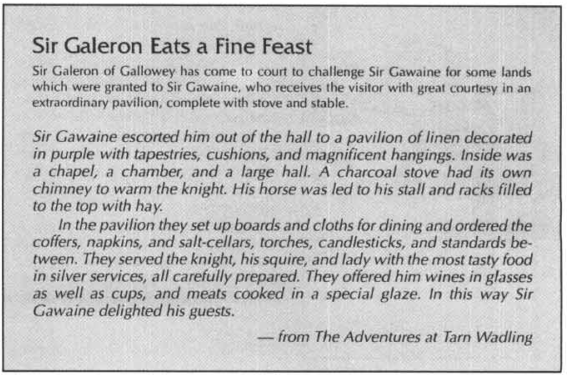
This is the kid of stuff you blow money on without even making a note of it with your GM; it just sort of happens.
Included here is a section on The Lord's Progress - most lords have a main dwelling, but also roam around their lands visiting manors and lesser nobles and suchlike. The reason for this is both political and economical - in the book's words, "it is easier for them to go where the food is rather than move the food."
There are bits on retinues, on heralds, and a pair of price lists - one for a "standard" town, and a "Great City Price List" that includes some of the rarer items or services that can only be found in the greatest of metropolises (in Pendragon, this typically equates to "either Camelot or London and nowhere else"). The latter includes such exotic items as professional women, carpets ("the latest thing, my lord, for the cold castle floor!), lawyers, and hiring professional musicians to compose mocking poetry to make your enemies look stupid. Prices, it is noted, are non-negotiable - it is "beneath a knight to bicker with a merchant, anyway."
So how do we get money? Well, land is the most common method; you own it, peasants work it, you take the fruits of their labor because you're noble and that's what you do. Ransoming off captives is another common method for knights to enrich themselves.
There are also the Four Universal Aids - four taxes that each noble is entitled, by law and custom, to demand of his vassals. You can demand that your vassals cough up cash for the knighting of your eldest son, the wedding of your eldest daughter, to ransom the lord, or to pay for a Crusade (something which, to my knowledge, never gets addressed in Pendragon despite the book's claim that it will be in a future supplement).
A lord can also attempt to impose a Tallage, which essentially consists of the lord saying to his court, "Hey, I want you guys to give me money so I can pay for (more warships/equipping an army/building a bridge/building a swimming pool full of gold coins for me to jump into)." The court then discusses whether or not they think the lord was persuasive enough, and pay or don't pay as they like.
Lastly there is the Impost, which is a tax or fine levied directly on the peasantry. This can be for just reasons ("this town broke the King's Law and now you are fined half of your earnings for the year") or arbitrary ones ("I'm short on cash, give me all your potatoes"). It is then collected with whatever force is necessary, "and the only cost is the undying hatred of the people who supply your daily bread."
Other sources of wealth include service at Court (especially as a seneschal or marshal), being a really good Steward so that your lands are more productive than usual, winning tourneys, loot from war, conquering new land, and marrying rich widows.
There is a lot of room here for a kind of realpolitik examination of the callousness of the nobility and the oppression of the working man, but I would humbly suggest that Pendragon is probably not the game to perform such an examination in, given that all the Pcs tend to be products of the privileged environment that perpetuates the corrupt system and all that. But, hey, if that's your thing go hog wild.
Our next chapter is a little less depressing and is about Chivalric Duties . Basically the day-to-day stuff that entails the duties of a knight other than "kill the enemy."
The opening section is on Courtesy , which is in this sense defined as Court Business. Stuff that happens at Court is handled by Courtesy. Holding ceremonies, proper court protocol, accommodations, departures, et cetera. Entire sessions can be set in court, for more politically-oriented groups - and this should not be seen as "less knightly" than going out on quests, because this stuff matters too. In fact there are several characters in the canon who spend almost all of their time at court, leaving for adventure only when the need arises rather than out of a desire to go forth and find trouble (Sir Kay and Sir Tor, to name two).
Next section is on The Hunt , in which most attention is given to the etiquette and minutae of the hunt as opposed to the mechanics, which get glossed over:
quote:
In a hunt most activity consist of making successful Horsemanship rolls with various modifiers, plus rolls for your horses’ statistics, and for your own Hunting skill. You will fall behind or pull ahead, probably get lost, and perhaps get in on the kill if you are skillful or lucky.
Cornered animals may be fought hand-to-tooth, using noma1 melee rules. Remember that it is courteous to allow the most highly ranked person to attack first, if possible.
"No, no, my lord, you take the first swing at the boar, I insist ...."

Next is the Tournament , and tournaments are awesome. There are four styles of tournaments, "with the older styles being practiced in the lands furthest from trend-setting Camelot." These styles are called Old, Full, Classic, and Elegant; Full is the type described here, as it is Camelot's preferred style.
Knights show up at tournaments for Glory. Glory is awarded to every knight in attendance for every fight in the tournament even if they weren't in them; you were there , and that's what matters (no one gives a shit that you rode the bench for the entire World Series if you have the ring, baby). Additional Glory is given to winners, of course, and to the lord who hosted the tournament.
Tournaments are also divided by size - Neighborhood Tournaments usually have around 100 knights competing, while Local Tournaments are usually sponsored by an earl and pit his knights against a neighbor's knights - joining teams is encouraged - and usually involved 500-1000 knights. Regional tournaments involve 2000 or so knights and usually happen once every few years; dukes hold these, or maybe an earl who's really rich and has decided to blow a lot of money. Lastly, Regal Tournaments involve upwards of three thousand knights. Arthur holds one every year at Pentecost, and occasionally sponsors one in a distant corner of his realm just to keep life in the backwaters interesting; otherwise, they are very rare. You get 30 Glory just for being at a Regal Tournament, even if you get knocked out in the first round of jousting and spend a week in bed looking at pretty colors; winners get large sums of Glory.
There are typically three events at a tournament - the joust, the melee (a big ol' free-for-all between two teams where everyone bashes the fuck out of each other with blunted weapons), and the challenges, which is where anyone can call someone out and challenge them to a contest of skill or arms or whatever.
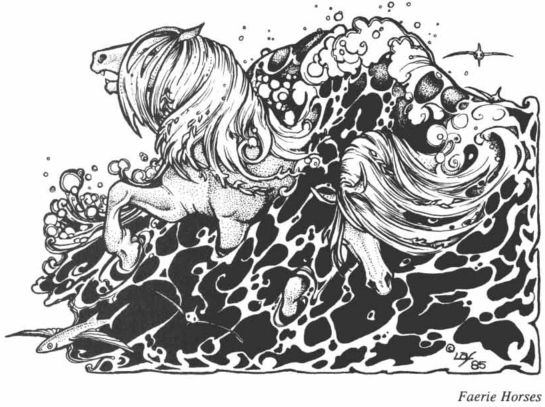
have a picture of Faerie Horses here, sure, fuck it, why not
There are some details about how tournaments work, what gets a person disqualified from a tournament, et cetera.
Next is a section on Romance , a topic we've already discussed a few times. We'll talk about it some more, though, because it's kind of thematically important.
quote:
At the court of Camelot Courtly Love is a popular type of entertainment. In a sense, it says that the duty of women is to flirt with well-spoken guests, and to receive flattery from them and from passing troubadours.
Fine Amor is an invention of ladies and poets to recognize and reward the gentler sex. It is love for love’s sake - romantic and passionate love which must be contrasted to the emotionless, political attitude of arranged marriage.
There is, I shit you not, a Romantic Affair Table :
quote:
The romantic love affair moves through
these stages:
1. Worship through passionate declaration of the love (in private of course).
2. Virtuous rejection by the lady.
3. Renewed wooing, with proofs and oaths of fidelity to the lady.
4. Deeds of valor and heroism to prove courage and strength.
5. Acceptance of the lover by the woman, followed by consummation of their secret affair.
6. Subterfuge and troubles, keeping their affair secret and alive.
7. A tragic ending when the affair is discovered, made more poignant by the depth of the tragedy.
Note that this is how romantic affairs are expected to go. Like, everyone knows, going into an affair, that it will probably end badly and they do it anyways .
Of course, some affairs are chaste - in fact, some consider a chaste affair to be the highest expression of love. Sir Galahad, the world's purest knight, engaged in such a chaste affair of the heart with Sir Percivale's sister Lady Amide. Everyone thought that this was what Lancelot and Guenevere were up to; the discovered truth tore the Round Table apart.
This leads us to the subsection entitled, appropriately, "Isn't Romance Silly?"
quote:
Knights in love act like fools. Sir Palomides,one of the finest fighters and most noble knights in the land, spends his spare time weeping, starving to death, and otherwise moping around. Likewise another lover, Sir Alisander le Orphelin, looks at his lover-to-be and is struck so dumb “that he wist not whether he were on horseback or on foot.” (Malory, X, 39). They are not sensible or rational. It is hard for most of us to imagine why anyone would even pretend to act that way.
While there is a lot of justification and explanation here, the core concept boils down to this - everything in Pendragon - in the game and the canon from which it was developed - is turned up to eleven.
It's not enough for Arthur to be sad when he hears about a knight's death - he has to weep openly. It's not enough for Lancelot to be upset that Guenevere has a jealous outburst - he has to go mad and run around in the forest. The application of a modern sensibility (or, some might argue, any sensibility) to the emotional rollercoaster of a Pendragon character's existence is a mistake; it's meant to be melodrama to a ridiculous degree. Run with it. It's actually kinda fun.
Next up: Religion . As opposed to the "let's examine religion as Pendragon characters know it" of the earlier chapter, this section is more about religion in the day-to-day life of a character and a few scattered thoughts about "how to portray" religion in a game (for instance, there are two subsections about good things the Catholic Church has done and bad things it's done, with the suggestion that ignoring either side is probably pretty dumb). There's even a note about changing religion in-game.
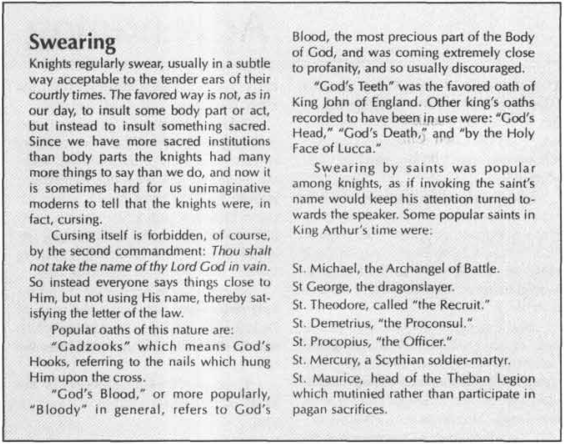
You gotta love any game that says "here's some ideas about how your character can say the appropriate equivalent of 'motherfucker'."
There's like half a page on Adventuring , which is pretty self-explanatory... and then the section on Battle , which, because it's kinda long and has associated mechanical systems, I will save for later.
Battle
Original SA post
Before I start I just wanted to say that the news that people have picked this game up as a result of my coverage is fucking awesome and I hope you all enjoy the hell out of it.
So where were we? Oh, right - Battle .
"Battles are a large part of a knight’s life." the game tells us in the opening of this subsection. "Individual heroism on lonely adventures represents the new type of knighthood. Old knighthood glories in organized mass killing, and reserves for itself the right to regularly use violence. These combats, called battles, occur often."
For all the glory of chivalrous conduct and body-to-body fighting, it must be remembered that the biggest reason knights exist is still as part of armies. Some of the most glorious and well-known aspects of the canon of Arthuriana revolve around battles - the Battle of Badon Hill, where Saxon power in England was broken for centuries, or Arthur's siege of Rome, or of course the Battle of Salisbury, where Arthur fell and the Round Table fell into legend. You just can't beat large masses of people trying to kill one another for drama.
Now, remember way back when I was talking about the ranks of knighthood and the right of some knights to carry pennants or banners? Battle is the reason for those things. In battle, in this time period, the usual system of army organization is for a small group of men to follow a single leader whose banner they follow; large-scale organization generally falls apart after the first charge of men, and so no one really bothers. This is where the PCs generally come in, either as a group of banner-carriers who each lead a small force or as a small force in their own right.
quote:
The makeup and organization of most medieval battles and armies follows a traditional and predictable pattern. Army tactics rarely vary. Military sophistication is at a historical low. The feudal lords have enough difficulty just getting the armies to the field without having to maneuver them too!
The Pendragon battle system assumes that standard battle tactics are always followed. Variations in military strategy may be introduced in later Pendragon supplements or by the gamemaster, but they will be applied to this basic system.
We get some detail on the organization of a feudal army - knights are the heavy cavalry, unknighted professional warriors are sergeants, hobilars are mounted, unarmored troops used as scouts or messengers but never mustered as a unit, infantry is essentially a mass of unarmored peasants, and engineers are in charge of siege engines and siege works. Heralds are also mentioned, having a unique noncombatant status that is considered sacrosanct.
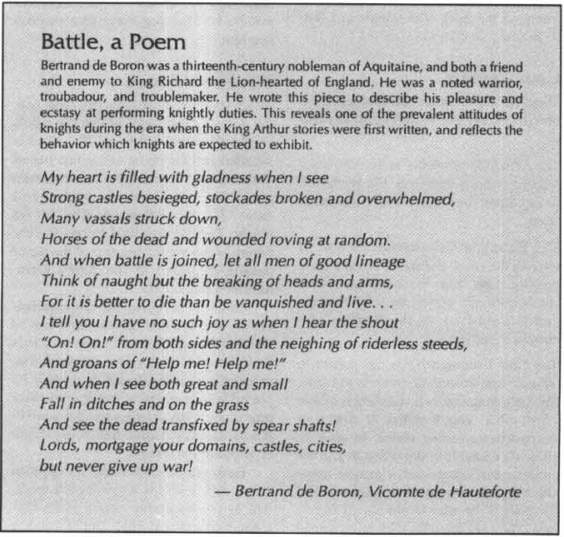
Battle is not exactly 'nice.'
Mechanically, everything about a battle that isn't about stabbing someone in the brainpan or riding your horse is covered by - you guessed it - the Battle skill. Battle covers everything , from supply trains to unit maneuvering to tactics to strategy.
We start getting into some crunch here, but boiling everything down to basics gets us this:
At the beginning of a battle, the overall commander makes a Battle roll. Success on this roll gives bonuses to the First Charge - the moment where opposing lines of battle are drawn up and then rush at one another at full speed. This is often the only time in the battle where knights will have an opportunity to use their Lance skill.
The armies crash into one another, and then the GM rolls for each charging knight to see how good their opponent is; each knight takes part in an opposed lance charge to see if they knock the bad guy down. Then each unit leader rolls Battle to see how well their troops did; during the first round, prisoners cannot be taken.
Then each subsequent round - each round representing somewhere between 15-30 minutes of combat - is a melee round, where more tables are rolled on in order to determine Unit Events (i.e. 'this round, your opponent's battalion has received reinforcements!'), who your character's individual opponent is, et cetera. Characters can disengage from battle and re-enter battle pretty much at will.
There are a number of ways these results can interact; if the PC's battalion routs, for instance, the PC can choose to stand their ground and rally their battalion, fighting a melee round as normal and, if critically successful, rallying their men, gaining 100 Glory "and the attention of their commanders." This is important, as a battalion can rout literally at any time - you can be fighting successfully and effectively for six rounds and then a single roll of 3 on 3d6 means your dudes run away.
Which is on the one hand a little bit stupid but on the other hand also nicely encapsulates the chaotic nature of a medieval battle, where your untrained peasants can basically say 'screw this noise' at any time.
Glory for battle participation is the same for everyone (you may get additional Glory for your personal actions, like unhorsing a knight in the First Charge), and is determined by battle size and length and the results of each round's Battle rolls.
Pendragon's Battle system is one of those kinda clunky systems that works really well once you get used to it. I wouldn't say it's a "good" system - it's slow, not very narratively easy to work with, and occasionally frustratingly random - but it's one of those systems that grows on you as you get used to it, at least in my experience; it becomes easier to overlook its clunkiness and also easier to appreciate the interesting results it gives you. The first time you get an enemy battalion to rout even though they've been kicking your ass - and you and the GM combine to come up with a compelling story why they routed - it's easy to sell yourself on it.
I understand that 5th Edition streamlined Battle a great deal, which is cool and hopefully eventually I'll look into it and explain how and why, but that will have to wait. This is going to be a short post, because the next section is arguably my least favorite in the book - Magician Character Creation and Magic in Pendragon.
Oh boy.
Magician Creation
Original SA post
So, um... yeah, sorry. I've been a slacker.
But I follow through on my promises (usually), so I bring you...


Notice that it does not say "and also reasons why it's a good idea" because IT'S NOT
Easily the least-beloved section of the Pendragon rules among - in my experience - its diehard fans, the Magic rules and the fact that they allow for Magician PCs is unique to the game's 4th Edition (later and future editions basically said "handwave the magic, you're the GM, you're allowed; also don't let PCs be magicians").
They sorta suck.
To begin with the Magician Character Creation - it's largely similar to the rules for Knightly Character Creation, except that your Father's Class can be peasantry (because "Magic Talents do not know class, nor do practical schools of magic recognize a difference between base or noble origins" despite the fact that compared to the children of nobility Peasant kids get shit for bonuses - magic may not know class but the rest of life ain't forgotten). You build a character, try to qualify for a rank - in this case divided into several groups like 'British Enchanters,' 'Christian priests,' or 'Pagan Witches' - and off you go.
The main differences, of course, are that your character has access to the (fairly wonky) Magic system, and that instead of Honor, magicians pursue
Insight
.
Insight works
exactly the same as Honor does
, mechanically; the differences are all flavor-based, as Honor is a measure of the knight's reputation around the world while Insight is a measure of a magician's wisdom and experience, and usually the only people who care about it are other magicians unless you're really, really famous.
A word, before I continue, about the "flavor text" of Pendragon magic - much of it, especially the expressly Pagan magic styles, is heavily flavored by Wicca and other quasi-proto-New-Age-ancient-tradition-revival styles. The influence of Marion Zimmer Bradley's
The Mists of Avalon
- a retelling of the Arthurian stories from the point of view of a sympathetic Pagan priestess Morgan le Fay, struggling to maintain Britain's tradition and culture in the face of Arthur's ascension, conversion to Christianity, and embrace of foreign concepts of Knighthood and tourneys and the like - is plain to see, as are the influences of the author's own Druidic leanings and practices.
Now, I am well aware that the subject of Wicca and "neo-Paganism" and et cetera et cetera is one that's caused more than a few dismissive remarks, shouting matches, and/or wounded egos, so let me just say - there are places to have those discussion. Even on this very forum. This thread ain't one of 'em, so can we give it a pass? As someone who used to self-identify as a Wiccan (and yes, it could well be argued that I grew out of it, if one wanted to be cynical), I've had that series of arguments a couple of dozen times and I'm really tired of them.
Right. Onward, then!
Oh, right, one other thing - magician characters also start with a 'Childhood Talent,' rather in lieu of a roll on the Luck Table; this is the magical talent that first manifested for them as a kid and served as their Gateway Drug to Sorcery. Magicians also receive expertise in another (or more than one if they're lucky) Magical Talent upon being Initiated into their group's particular ways of doing things (initiation varying, obviously, from group to group).
There is also a (50%) chance for a PC to receive a Divine Patron upon their Initiation. For Christians, your Patron is a Saint; for Pagans, a God or Goddess (there's a table for each). These Patrons may require you to perform observances on sacred dates, or not. These Patrons provide an additional bonus (usually +10) to a Talent.
So that's neat. What the hell is a Talent and how does Magic work in Pendragon?
Talents I'll get to in a second. First let's talk about
Life Force
. Life Force is what fuels magic; it's mana, basically. You know, the little blue bottle in the Diablo games. Exactly. It's measured in d20s.
Each magician has an innate amount of Personal Life Force; in addition, their surroundings often contain Life Force that the magician can draw upon. If I may be forgiven for making a Dark Sun reference, all Pendragon Magicians are Preservers, not Defilers; they cannot draw more Life Force from an area than is needed to keep the local vegetation alive and the like. Now, certain times of year - sacred dates - can increase the amount of Life Force an area can provide, and sacred sites provide more than an ordinary stretch of forest or whatever - so a Pagan performing a sacred ceremony to cast a spell to increase the fertility of the region's herds will have much better luck doing it at Stonehenge on the Spring Equinox than he would have doing it on the side of the road on any random Tuesday. Christian Priests work the same way; there's a reason that divine healing is a lot more likely to happen at a certain shrine on a certain priest's holy day than it is to happen in the back room of a bar somewhere. For certain more bloodthirsty traditions, sacrifice - animal, plant, or human - might be in order as well, and can be harvested for additional Life Force. This is necessary, as a magician can't channel a whole lot of their own personal Life Force - the amount they can channel is limited by the sum of their Religious Traits, and for all but the most exemplary followers of a faith, this isn't enough to pull off even the most basic of spells.
Now, Talents work like Skills, and are tested in the same fashion; you get critical successes the same way, ditto fumbles, et cetera. You roll them in order to use an appropriate spell. So what are Talents?
Hah! Fooled you, still not there yet. First there are some Magician-specific Skills to talk about :
Celestial Lore
is the knowledge of checking out the stars to see when there might be some kind of awesome planetary conjunction or comet or whatever that will give a caster additional Life Force to use in a spell. Success on this roll can let a GM tell the PC when the most opportune time would be to attempt a magical working.
Faerie Lore
is available to all Pendragon characters, but magicians can use it for shit like identifying and traveling ley lines and entering the Otherworld and such.
Geomantic Lore
is kind of like geographic
feng shui
. It allows a magician to identify places of power and sacred importance, thus possibly finding more juju for their spells.
Religion
is another skill that everyone can get, but it's ridiculously important for magicians. All that sacred stuff that gives you bonus Life Force? Yeah, knowing that is covered by Religion. Oh, sure, your Christian Nun knows when Christmas is without needing to roll, granted, but do they know which specific saint would be best to call upon for attempting to heal a warrior who has been badly wounded by a dragon? Would it be St. George? What about St. Rita, the Patron of Healing of wounds? Wait, if the knight was injured defending a child, maybe St. Jerome, Patron of Abandoned Children would be better...
Sight
is an odd duck. Basically it's a Sense Magic skill. It's sort of a magic power without actually using magic itself, but then Second Sight has always been kind of an odd thing; typically you use it to find Life Force and other magicians.
All right, finally, a list of Talents!
Animal Friend
is the art of being Dr. Doolittle and talking to the animals. Or summoning them, or commanding them magically.
Banish
is making shit that comes from The Other Side go back there.
Blessing
is what it sounds like; it's kind of a utility Talent for "making good shit happen for a person and/or community." Giving someone luck, making the crops grow, et cetera.
Control Faerie Creature
is kind of like Banish, only instead of "go away" it's "stay here and do what I tell you."
Curse
is the opposite of Blessing. Of particular note is the highest-level effect listed, Age, which forces the person cursed to immediately make 1d3+3 rolls on the Aging Table which is
fucking brutal
and can end a character.
Demonize
is the ability to detect demonic and pseudo-demonic traits - i.e. telling the difference between "this man is a real asshole" and "this man is possessed by Satan."
Dispel
makes other magic go away.
Divination
can be used to tell the future, to get an idea of whether one will have good luck or ill... or to talk directly to the Gods (just call up and be all "Hey, Rhiannon, how are you? Hey, listen, I've got this issue I have to deal with, but first, are you doing anything this Saturday?").
Divine Miracle
is, effectively, asking a God (or THE God if you're a monotheist) to come down and lend a hand. "Lord, give me a sign" is a fairly simple usage; "Lord, please heal this army's wounds so that we may save our country from Saxon dominion" is a BIG FUCKIN' DEAL.
Emotion
lets you tweak someone's emotions, obviously; this is where Love Potions come from.
Glamour
is illusion, let's just leave it at that. Seriously, there's a whole longwinded explanation about how that isn't
quite
the case, but for all practical purposes, illusion. Done. There are like two pages of Glamour effects, which is a hell of a lot more than any other Talent gets, but considering the far-reaching effects of illusion that's probably understandable.
Healing
is what it sounds like. Heal quicker, make First Aid or Chirurgery rolls more successful, or just plain close wounds.
Necromancy
is talking to, commanding, and/or animating the dead.
Protect
is an active defense against hostile magic.
Sacred Space
is the ability to sanctify an area to aid future magical workings.
Shapeshift
is what it sounds like.
Summon Faerie Creature
Is the opposite of Banish, obviously.
Travel
lets you get there quicker. Or instantly.
Weather Control
is, I should hope, self-explanatory.
Okay, so how does all this shit
work
? Well, it's like this:
First you find the effect you want and determine its Life Force Cost. So let's say, for instance, you want to ensure that a sexual union is fertile (rather a common practice for medieval magic-types). This is a fairly common use of the Blessing Talent, and costs 50 Life Force.
Then you sit down to actually cast your spell. Now you have to find out how much Life Force is available.
Your first stop is always your Personal Life Force; this is always available to you, and doesn't get "used up" so to speak. It is equal to the sum of your five Religious Traits divided by 20. So let's say a beginning character probably has one Exceptional trait at 16, one that got raised a few times in chargen and is a 14, and the other three are at 10; that's a total of 60, divided by 20 is 3. So 3d20. You have 3d20 Life Force you can toss out there without needing to worry about it.
Here's the catch: you don't roll those 3d20 yet. You will never be able to say 'Well, I have 39 life force to throw in the pot' before casting.
So since you're not stupid and you want lots and lots of Life Force, you draw on additional sources. As you're probably helping some poor villager and his wife have a kid, you're probably in a village, and villages have 2d20 Life Force available. You also decide to wait until an appropriate sacred date, earning another +2d20. So now that's 7d20 Life Force available.
Now you actually do the casting - do whatever hocus-pocus is appropriate, it takes a long time, et cetera, et cetera, okay, flavor text done. Now you roll your Talent, as you would any other Skill. Success, it works, failure, it doesn't.
Now
you can roll those d20s to see if there is enough available Life Force.
What's that? You succeeded at your Talent roll but had a shitty roll for the Life Force dice and came up a few points short? Sucks to be you, bucko. The spell fizzles. Shoulda gone to Stonehenge.
(edit: the above paragraph is my own interpretation; the game appears to not actually directly address a shortfall in Life Force and its effects. So. Yeah.)
Now, all of that sounds at least vaguely reasonable, right? Except... here's the thing. There's one other step I've elided until now, and it's called "Paying the Cost."
See, spells require
preparation
. For each 10 points of Life Force a magician expects to channel (or 20 points if only a Natural Talent - one learned in childhood or at Initiation - is used), they need to spend a
week
in preparation and isolation. That's five weeks of hanging out in the woods for our fertility blessing.
If you don't have that prep time, well, you can still cast the spell... but instead of prep time you have to pay in Magical Slumber. For each 10 (or 20, as above) points of Life Force channeled, you mark down a week in a "sleep owed" box on your character sheet (yeah, magicians get their own sheet); you have seven days to find a comfy, safe spot to take a nap and sleep for that number of weeks (you can't starve to death in magical slumber, thankfully). If you don't get the Slumber underway in seven days, you start taking rolls on the Aging Table instead.
...now, can anyone see the problem here?
Pendragon magic, while thematic and appropriate and really kinda cool... is
wholly unsuitable for almost every group of player characters
, because no one really wants to be the guy who saves the adventuring party with a timely fireball or whatever and then his character is effectively out of play for the next in-game month, and very few adventures will allow PCs the time necessary to say "okay, guys, we have a plan to defeat the villain but we have to wait until next month so our wizard can prep up his cool spell and wait for the right planetary alignment."
It works beautifully -
beautifully
- for NPCs like Merlin or Morgaine; it's thematic, it makes perfect sense within the game mechanics and the canon on which those mechanics are based, it
feels Arthurian.
But it's absolutely shitty in actual play. There are some ways around this, involving the creation of Talismans (stored effects, basically) or group workings, but really, in an actual play scenario - unless the scenario is crafted with exquisite care by a very talented GM - it falls down. There is no room for the kind of spur-of-the-moment ideas that so many gaming groups thrive on.
This is one example of how Pendragon occasionally gets in its own way - it strives so hard to be a good representation of the Arthurian canon that it will sacrifice gameplay for proper atmosphere. Shame, really - I do quite like the magic rules in and of themselves, I just don't like how they fit (or fail to fit) with the rest of the game's normal play.
Next section is
Scenarios
, which I'll try to avoid covering in TOO much detail because I know some of you are running or playing the game and I don't want to spoil any GMs' fun, but I can manage an overview, at least.
Scenarios
Original SA postDivineCoffeeBinge posted:
So, um... yeah, sorry. I've been a slacker.
But I follow through on my promises (usually), so I bring you...
Laziness... laziness never changes.

Welcome to the final installment of the Pendragon 4th Edition Core Book Readthrough. Immediately following the magic wonkiness I talked about last time, we get the Scenarios chapter.
The first scenario is the "Introductory Scenario," designed to introduce new players to Pendragon's rules, mechanics, setting, and playstyle. It's really very good at it, actually. Unfortunately, I can't talk about it too much because ibntumart is running a PbP of Pendragon here on SA that is currently in the middle of said scenario; suffice it to say it kind of works like a "guided tour" of what it means to be a knight. There's an introduction to combat, hunting, court, vassalage, et cetera, and is designed to be run for squires; the adventure ends with the knighting ceremony.
I quite like it, for all that it's kind of "Babby's First Pendragon;" anyone more used to the system will find it plodding and formulaic, but for people new to the game it's wonderfully informative without being a lecture. You don't learn how knights hunt by being told, you learn by going out and doing it, and so on. It's a tutorial level for a tabletop game.
After the tutorial adventure, we get a section on Solos - solo play adventures, designed to be run for a single character only. These are handy for any number of reasons, but to my mind the best thing about them is that by and large they are - while occasionally very exciting and hectic - also fairly mundane . The solos are designed to handle the day-to-day stuff that knights are expected to do, like vassal service (generating a random task that your liege gives you to do, then going out and doing it) or managing your own demense - the stuff that isn't typically the centerpiece of a Grand Adventure.
That's not to say they're dull, of course; when "managing your demense" includes "fighting off a raiding party of several dozen crazed Saxons" you tend to have to stay on your toes. It's just that you're not going to be making your way into Mallory with this stuff.
After the Solos we get to Adventures proper, and we start off with one called "The Adventure of the White Horse." Interestingly, it is presented twice - there is a "short form" and a "long form" of the adventure. The reason for this is that Greg Stafford has presented a whole bunch of adventures in a short form format - kind of a broad outline - and then uses this adventure to show a beginning GM the kind of work required to turn that outline into a real game session.
It's not a bad idea, and Pendragon is, to my mind, one of the best games out there for operating under the assumption that not everyone has done this stuff before. I get a real sense that Stafford was hopeful that this book could be used to bring non-roleplayers into the hobby. There's a degree of time spent on concepts that would be instantly recognizable to the hardened roleplayer that tries to make things interesting and easy to understand; when Stafford talks about running a game, it's not the generic pro forma "advice" one sees in most RPGs. Whether this is endearing or irritating is, of course, a question of taste.
Interestingly, Stafford even indirectly instructs his presumptive novice GMs to feel free to adjust or even disregard the material, as he flatly admits that the long form of the Adventure of the White Horse has a slightly different plot than the short form, in order to give players more opportunity for Intrigue.
As for the adventure itself, it's simple on the face of it - the PCs are given the opportunity to participate in a Pagan ritual "horse blessing" that requires them to engage in a lot of activity while trying to stay awake, and tires out their horses; those that act 'correctly' get bonuses to their horse's stats and possibly the friendship of a powerful Pagan priestess. There are also a number of hooks that could lead them off into a completely separate adventure entirely, because why not?
The rest of the adventures are given as short form outlines, and some of them are a little problematic. Why?
quote:
Always warn characters of the potential dangers in these adventures. Some of them are just plain hard, while others are destined never to be solved until the appearance of Lancelot or Galahad , though gamemasters may wish to alter that version of the tale to give these feats to player characters. But part of the long-term campaign concept is to have some adventures which are not immediately solved, and which can be revisited years later, either by player knights or gamemaster characters.
Most of these adventures appear in some form or another in the canon; if the PCs participate in "the Adventure of the Adventurous Shield" and find the glowing white shield that is destined for use by Sir Galahad, they can't just pick it up. It's destined for use by Sir Galahad, after all. So... they can look at it. Whoo. Yay. Oh, and they can fight the angel who guards it; they will lose, but hey, at least they can get Glory if they lose well.
Now... this is very thematic. There are in fact a lot of tales in the Arthurian canon that boil down to "and then the knights saw Something That Was Awesome, and they left, talking to each other about how Awesome it was." Very Arthurian. Not so much fun to play.
That bit about adventures being revisited late, by the way? That's also designed to echo the canon. Stafford again:
quote:
The Adventure of the Basilisk, for instance, cannot be solved by knights. But perhaps the witch queen found in that adventure will catch the magical weasel if the knights will do a favor for her: a powerful knight is blocking the road to her castle. Will the knights help her? If so, this leads to the Adventure of The Knight Of The Moon. The Knight of the Moon agrees to let the knights go ahead of his army and fight his foe, who is described in the Adventure of the Headless Dead.
The characters win. This finishes the tasks initiated by the witch queen and, conveniently, kills the sorcerer who has created the basilisk.
This is, again, very Arthurian; Event One leads to Event Two leads to Event Three which ends up solving the problem in Event One. This shit happens to knights all the time in the canon. That said, it takes a certain mindset to just run with these only-vaguely-interconnected events in the hope that eventually a resolution is coming, and not every gamer has that mindset.
In the end, the adventures presented in the core book are, to my mind, best utilized as interstitial events between more "traditional" RPG-style adventures. There's nothing wrong with throwing the Adventure of The Damosel of the Sunflowers at your players, but if that type of adventure is all there is, you'll quickly see your PCs get bored; it's a thin line between 'several discrete adventures' and 'oh great, another monster-of-the-week episode.'
Unfortunately, there's nothing in the book about the more traditional long-form arcs that most of us come to expect from our gaming; it's not the style that Stafford was aiming for. There's nothing wrong with this - just like there's nothing wrong with a D&D game where the players clear out monster-infested dungeons week after week without worrying about where they came from - if that's what your group is looking for... it's just that a modern roleplaying group will find the style shift jarring.
The scenarios themselves are a mixed bag. Some of my favorites include The Adventure of the Avanc (there's an aquatic monster that can only be readily handled if a virgin woman sits on the shore of its lake, at which point it will emerge from the water and sleep with its head in the woman's lap), The Adventure of the Dolorous Garde (the PCs come across a castle full of terrifying guardians; this was canonically cleared out by Lancelot and renamed to Joyous Garde but, hell, maybe they can try and beat him to it), The Adventure of the Half-A-Giant (there's a giant. He's buried so only half of him is visible. So... what are you gonna do about this?), The Adventure of the Lady in Pink (try to defeat a glorious knight, who will only release a Lady from captivity to the one who can beat him), and the Adventure of the Questing Beast (try to capture a mythical creature; you won't be able to, but hey, neither was anyone in the canon, so at least you're in good company).
Then there's a Characters and Creatures section - a monster manual, really, with stats for various types of knight and soldiers, as well as quarry for the hunt and more fantastic monsters like giants and dragons and such. There are character sheets given for certain notables, like King Arthur (100,000 Glory!), Guenevere, Lamorak de Gales, Lancelot, Gawaine, et cetera.
Then comes a Bibliography (a really very good one, too, IMHO), a summation of character creation, a glossary, and an index.
And that. Is. It. Yay!
....so, question. What should I cover next? Land of Giants , the sourcebook for northmen characters and adventure in Scandanavia? Pagan Shore , for Arthurian Ireland? Lordly Domains , for greater detail on running a demense?
Or I could step away from Pendragon for a bit and do Shadow Knight , the Amber Diceless sourcebook that serves as an expansion to the Amber Diceless Roleplaying Game that Rulebook Heavily did... or, hell, if you find me dull you could always suggest I do nothing at all and let more talented people keep the center stage. That works too. I'm easy.
